




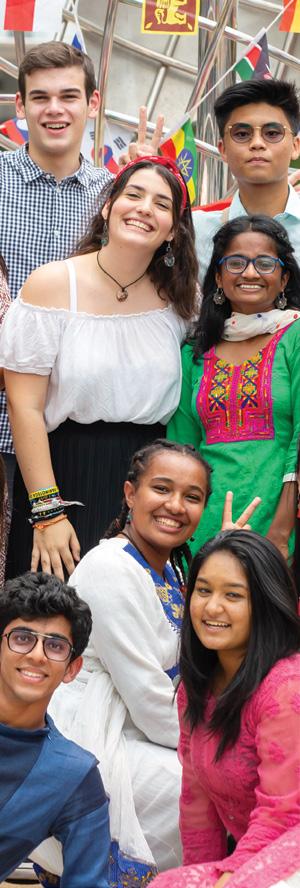









On behalf of the Board of Governors, I am pleased to present the UWCSEA 2020/2021 Annual Report to our community, which provides an overview and reflection of the College’s achievements over the year.
The 2020/2021 school year was my first as Chair of the Board. I accepted the role with a commitment to being of service to this great institution, the staff, parents and incredible students who make us not just a school, but a community. The Annual Report tells the story of a community, united in purpose and unwavering in its commitment to our great mission, even as we responded to the challenges of a global pandemic. I am humbled and proud.
We began our school year having learned the lessons of the early days of the pandemic, and prepared for the longer–if no less unpredictable–journey that was ahead of us. It was December before all our new and returning families were able to join us in Singapore, and our staff and faculty extended our online learning programme to support students and scholars as they participated in our learning programme from afar. Singapore’s handling of the crisis continued to guide our decisions as restrictions were lifted and then reintroduced throughout the year.
This flexibility and responsiveness characterised much of the year as the Board and College leadership re-prioritised operations and ensured a compassionate response to the
changed conditions for students, staff and families. The Finance and Infrastructure Committee continued to be instrumental, working alongside the College leadership to model potential futures, while the Education and Talent and Engagement Committees continued to support the learning and community programmes that ensure our mission and vision thrives, despite the challenges.
The Board and College continued to deliver on the Strategic Plan 2018-2023 throughout the school year, while also beginning conversations about the next vision and strategy for the College, including the school of the future, under the working title, Vision 2030. In particular, Governors focused on:
• a review of the constitutional documents and governance framework, initiated the previous year, to ensure our governance structures support the future development of our College
• the ongoing work of our Diversity, Equity and Inclusion (DEI) Steering Group and the task force focused on deliberate anti-racism, as we committed to long-term, systemic change
• risk management and the College’s response to operational and reputational risk
• a review of our financial strategy, including our investment strategy and financial planning for the upcoming Dover Campus lease in 2030
• the initiation of a review of the UWCSEA Foundation, investigating a more ambitious future for the Foundation and identifying the role of philanthropy in the long-term future of the College
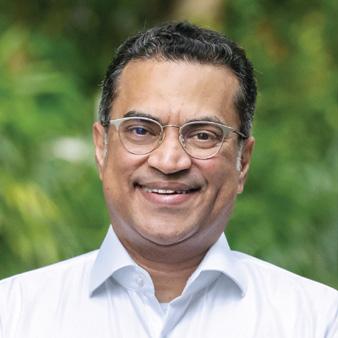
Other highlights of the achievements against the plan can be viewed in the Strategic Plan section of this report.
On behalf of the Board of Governors, I would like to express my thanks and appreciation to the staff and leadership for their dedication and to our parents for their trust in us. Most of all, I would like to express my admiration for our remarkable students, in whose service we all stand. At each Board meeting this year, we heard from students talking about topics ranging from DEI to mental health to leadership and strategic planning for their Student Councils. As we reflect on the 2020/2021 school year, we acknowledge that while many of the things we had previously taken for granted are now changed, our students continue to be our inspiration and hope for the future.
Sincerely, Madan Menon
Welcome to the Annual Report for the 2020/2021 school year. Each year the Annual Report tells a story of success and achievement, and last year was no different. When read alongside the Impact of Giving report, it tells the story of a community united in creating a more peaceful and sustainable future for all.
I write this towards the end of 2021, as the Omicron variant creates uncertainty once more, having just received our 56th advisory from the Committee for Private Education (CPE), outlining the next set of safe management measures for our school. Henry Ford’s quote “Coming together is a beginning, staying together is progress, and working together is success” characterised our school year in 2020/2021, my second at the College, as we all worked together to ensure continuity of learning for students in the midst of an everchanging regulatory environment.
We were able to lean on the experience of the previous year to develop blended learning programmes, and staff showed both creativity and resilience as they found new ways to deliver on our commitment to students and their parents. As predicted last year,
short-term solutions evolved into long-term strategy as restrictions on travel and gathering in large groups continued to impact our service and outdoor education programmes. With a renewed focus on mental health and wellbeing, we worked together to address the challenges that emerge when communities experience daily restrictions, and for many, coping with being separated from loved ones for extended periods proved to be the most challenging of times.
Despite the challenges, our focus on the future remained, with our mission and our values to guide us. We relaunched our Kishore Mahbubani Speaker Series, Reimagining Learning, with a goal of hosting conversations on the future of learning in the lead-up to our 50th anniversary in the 2021/2022 school year. Pioneers and thinkers in education joined us to imagine the future of education, one that is aligned with the needs of our students so as to better equip them to step into their future and thrive. Alongside extending our thinking, we also began the renewal of our Grade 9/10 programme, devised an on-campus and ‘hyper local’ outdoor learning programme and piloted peacebuilding units for our very youngest learners in K1.
I would like to finish once again with a sincere thank you, on behalf of the entire community, to the Board of Governors, who work tirelessly in service to the College and whose leadership and support last year made so many things possible. It is a privilege to work with such a committed and talented group of volunteers.
Carma Elliot CMG OBE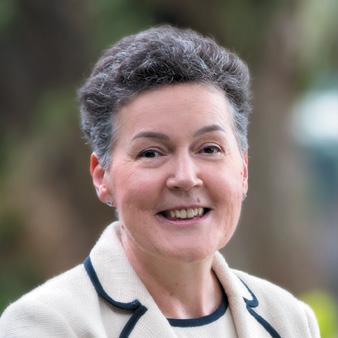

“We must prepare our young people with the knowledge, understanding, skills and, most importantly, values that will help the next generation make decisions in often complex and ambiguous environments-decisions that will fulfill a mission for a more peaceful and sustainable future.”

Because UWCSEA is driven by its mission, values and educational goal, we create an environment that is underpinned by wellbeing and learning principles, and provide a holistic learning programme through a K–12 concept-based curriculum. The UWCSEA learning programme thoughtfully and deliberately provides all students with age-appropriate opportunities to develop the knowledge, skills, qualities and mission competencies that will enable them to live the mission throughout their lives.
UWCSEA Ambition: Our ambition is to be a leader in international education, with a worldwide reputation for providing a challenging, holistic, values-based education with an emphasis upon academic achievement, service to others, environmental stewardship, teamwork and leadership.
Our learning principles are based on the understanding that learning is a life-long process in which the learner engages with and reflects upon information and experiences to construct new or modify existing understanding as well as develop and apply qualities and skills.
We know that learning is effective when learners:
• construct new understanding by activating prior knowledge and experience
• use timely and goal directed feedback
• collaborate
• are challenged
• feel secure and supported
• construct meaning by seeing patterns and making connections
• actively process and reflect
• apply meta-cognitive skills
• understand the purpose of the learning
• have ownership of their learning
Our learning programme consists of five interlinking elements: academics, activities, outdoor education, personal and social education and service. The elements combine to provide our students with a holistic, values-based education that develops them as individuals and as members of a global society. We apply these core principles to all elements of our programme: disciplinary and interdisciplinary learning, experiential learning and transfer of learning to ensure the educational experience provided at UWCSEA is truly holistic.
We have identified the qualities and skills needed by our community to help to fulfil our mission. Students are given multiple, age-appropriate opportunities to develop the following:
Commitment to care Principled Resilience





















































































































































































































































The diagram of the guiding statements was used in a consultation process with key stakeholders during the 2020/2021 school year, with a particular focus on developing greater understanding and working toward confirming definitions of the mission competencies. The values that emerged from the Values in Action consultation process in previous years were adopted as the College furthered the project, which commenced the previous school year.

UWCSEA is a member of the UWC movement, a group of 18 schools and colleges around the world who are supported by a network of National Committees, made up of volunteers in over 150 countries. Opened by the then Prime Minister Mr Lee Kuan Yew as Singapore International School in 1971, UWCSEA is the largest UWC in the movement, and one of seven that enrol students before the IB Diploma in Grade 11.

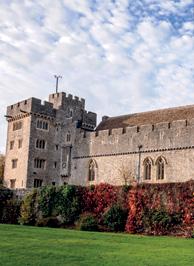


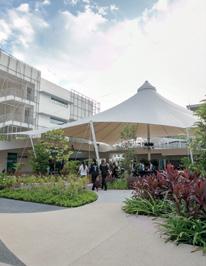





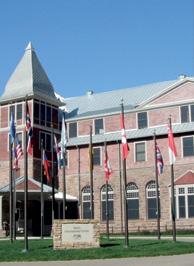






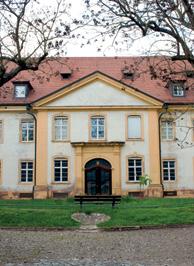

UWCSEA is committed to the highest standards of corporate governance. The UWCSEA Board of Governors recognises good governance as critical in supporting the school in achieving its mission and educational goal. Good governance begins with the Board of Governors and requires that they set the tone for the organisation.
The Board of Governors is one of the principal bodies with the fiduciary obligation to ensure that the College acts to further its stated objectives, and that the College has appropriate systems in place to properly account for and safeguard the funds and assets of the College. The Board of Governors works closely with the management and stakeholders of the College to shape the vision, chart the major directions, and develop programmes and initiatives to produce a strong and enduring impact for the College in Singapore and beyond.
The UWCSEA Board of Governors currently comprises 16 members. The Board includes respected business and industry leaders, academics, educators, entrepreneurs and professionals. All members serve on a voluntary basis.
The maximum number of Governors is 21. The Board has seven committees:
• Education and Talent, which sets and oversees education and talent management strategies
• Foundation Investment and Disbursement, which provides strategic direction for the Foundation’s investments and oversight of its disbursements and investments
• Finance and Infrastructure, which oversees the College’s finances and its physical and digital infrastructure
• Governance, which is responsible for nominations and governance matters
• Audit and Risk, which oversees audit and risk matters
• Engagement, which is responsible for improving the engagement and outreach of the College locally and globally, including the UWCSEA Foundation

• Committee of Chairs, which functions as a coordinating and management committee among the Chairs of the Board and Committees
Governors periodically re-evaluate the committee structure to ensure it is effective, strategic and forward-looking.
The Board meets four times each year. Each Governor is usually a member of one committee, which also meets a minimum of four times per year.
Following the Heidrick & Struggles report (made available to the College community in May 2019), a Constitutional Review Steering Group was set up in 2020 to address the following:
• improving documentation to clarify the role of the Board and Management to all stakeholders
• creating efficiencies by streamlining Board and committee papers
• improving induction and support for new Governors and Advisers
• providing useful and tailored training, engagement and team building opportunities for Governors, Advisers and management
In 2020/2021 the Steering Group made progress in all areas outlined above; work is anticipated to conclude in the 2021/2022 year. It is envisaged that the outcomes of the review will include the formation of two new working groups; Governance Practice Working Group and Strategic Planning Working Group. Additionally, it is likely that the constitutions of UWCSEA and UWCSEA-East will be amended to incorporate changes to modernise language and clarify roles and responsibilities in order to create a more transparent governance structure.
The Board consists of three groups of Governors:
• Ad Personam Governors – the majority of Governors are appointed by the Board itself through a rigorous selection process. Many Ad Personam Governors are parents of current students of the College. To ensure the Board benefits from independent thinking, there are also several non-parent Governors
• Ex officio Governors – in 2020/2021, the College President remained Carma Elliot, CMG OBE
• Interested Party Governors – these are elected directly by their constituencies and include two parent-elects and two teacher-elects, one from each campus.
The Board recruits Ad Personam Governors through a robust process that responds to clearly defined skill requirements for the Board. Candidates are normally first co-opted as Advisers to Board Committees. New Ad Personam Governors are usually only selected from that pool of Advisers who have served on a Committee. Appointments are based on an assessment of the following factors:
• professional skills and fit with Board requirements
• role models for UWC values, culture and alignment with the mission
• demonstrated ability to contribute to a Board
• past contributions to UWC/service institutions
• impact on Board diversity
• leadership potential
• positive impact on government relations
There is a comprehensive induction programme for all Advisers and Governors that includes information about the College and the Board, an induction session with the Board Secretary, and meetings with the Chair of the Board and other Governors.
Governors serve a maximum of two, three-year terms. Only the Chair may serve up to two additional terms of three years.
The College and the Board holds its Governors and Advisers to a high standard and regularly evaluates each Governor against the following criteria:
• is prepared for meetings
• listens to and challenges others, when appropriate, while maintaining an atmosphere of respect
• contributes and participates in a manner consistent with UWCSEA values
• has made meaningful contributions to key decisions
• attends most meetings and is highly attentive when present
• contributes overall
The College has a Whistle Blowing policy through which members of the UWCSEA community may, in confidence, raise concerns about possible wrongdoing or improprieties in financial or other matters within the organisation. The Board thoroughly and appropriately investigates matters brought to its attention through the policy and takes appropriate follow-up action.
The College policy requires Board and staff members to disclose any conflict of interest in the performance of their duties. In the case of the Board, the policy requires Governors and Advisers to report potential conflicts to the Governance Committee, which may impose remedies specific to the situation.
The Board also adheres to the College’s policies on corporate and individual behaviour, including the Board of Governors Guidelines, Confidentiality Policy, Harassment Policy, Staff Safeguarding Code of Conduct, and the Equal Opportunities, Access and Disabilities Policy.
The Board has adopted best practices in key areas of governance that are closely aligned with the Code of Governance for Charities and Institutions of a Public Character (the “Code”). In line with the Commissioner of Charities requirements, UWCSEA’s Governance Evaluation Checklist and new Transparency Framework can be found via the Charity Portal website www.charities.gov.sg.
All information correct as at 31 July 2021.
(appointed 1 September 2020)
Ad Personam Governor Chair of the Board Chair of Committee of Chairs
Ad Personam Governor Education and Talent Committee
Ad Personam Governor
Chair of Education and Talent Committee
Audit and Risk Committee Committee of Chairs
Interested Party Governor –Parent Elect UWCSEA Dover Education and Talent Committee

Ad Personam Governor Chair of Engagement Committee Committee of Chairs
Vivek Kalra (retired 21 January 2021)
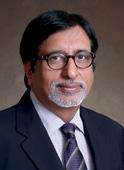
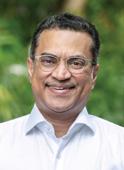
Ad Personam Governor Finance and Infrastructure Committee Finance and Infrastructure Investment SubCommittee
Interested Party Governor –
Common Room of UWCSEA East Governance Committee
(appointed 21 January 2021)
Ad Personam Governor Governance Committee
Interested Party Governor –Common Room of UWCSEA Dover Education and Talent Committee
Leon Toh
(appointed 21 January 2021)
Ad Personam Governor Engagement Committee Finance and Infrastructure Committee
Finance and Infrastructure Investment SubCommittee
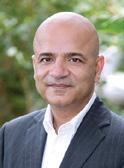
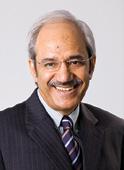
Ad Personam Governor
Interim Chair (to 31 August 2020)



Vice Chair (from 1 September 2020)

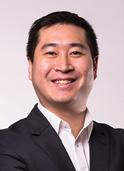

Ad Personam Governor Education and Talent Committee
(appointed 2 March 2021)
Ad Personam Governor Chair of Finance and Infrastructure Committee Chair of Finance and Infrastructure Investment SubCommittee Chair of Finance and Infrastructure Facilities SubCommittee Committee of Chairs
Chair of Finance and Infrastructure Committee (to 21 January 2021)
Chair of Finance and Infrastructure Investment SubCommittee (to 21 January 2021)
Interim Chair, Committee of Chairs (to 31 August 2020)
Chair of Governance Committee (from 21 January 2021) Committee of Chairs
Subodh Chanrai ’82 (resigned 21 January 2021)
Ad Personam Governor Chair of Governance Committee Committee of Chairs

(appointed 19 July 2021)
Ad Personam Governor Audit and Risk Committee
Ad Personam Governor Chair of Audit and Risk Committee Governance Committee Committee of Chairs

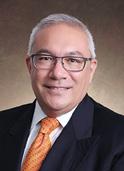
Interested Party Governor –Parent Elect UWCSEA East Engagement Committee
Ad Personam Governor Foundation Investment and Disbursement Committee Governance Committee
Carma Elliot CMG OBE


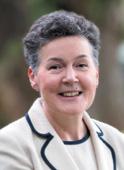
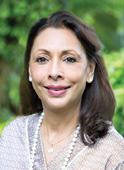
Ex-officio Governor –College President Education and Talent Committee Engagement Committee

Foundation Investment and Disbursement Committee Finance and Infrastructure Committee
Finance and Infrastructure Investment SubCommittee Governance Committee
Andrew Budden
(resigned 31 December 2020)
All information correct as at 31 July 2021.
Philip Motteram (resigned 31 December 2020)
Steve Okun (resigned 12 January 2021)
WT Cheah (resigned 31 December 2020)
Brian McAdoo (resigned 5 March 2021)
Prabhat Ojha (resigned 20 October 2020)
Leon Toh (transitioned to Ad Personam Governor 21 January 2021)
Jonathan Forth (transitioned to Ad Personam Governor 19 July 2021)
Ruby Lee (transitioned to Ad Personam Governor 21 January 2021)
Dimple Sanghi (transitioned to Ad Personam Governor 2 March 2021)
Daire Dunne
Rahul Raj
Tara Garson Flower
Sharon Heller (appointed 10 December 2020)
Vivek Kalra (transitioned to Board Adviser 21 January 2021)
Hyunggee Chung (appointed 18 March 2021)
Chas Pope (appointed 18 March 2021)
Yukiko Izumi (appointed 17 June 2021)
Anthony Hodge (appointed 17 June 2021)
All information correct as at 31 July 2021.
Audit and Risk Committee
Surinder Kathpalia, Chair
Heather Carmichael
Jonathan Forth
Anthony Hodge (Adviser)
Yukiko Izumi (Adviser)
Education and Talent Committee
Heather Carmichael, Chair
Seng Chee Ho
Benjamin Detenber
Carma Elliot CMG OBE
Mark Porter
Stefanie Green
Sharon Heller (Adviser)
Engagement Committee
Priti Devi, Chair
Caroline McLaughlin
Leon Toh
Carma Elliot CMG OBE
Foundation Investment and Disbursement Committee
Daire Dunne (Adviser), Chair
Kim Teo ’76
Carma Elliot CMG OBE
Finance and Infrastructure Committee (FIC)
Dimple Sanghi, Chair Leon Toh
Carma Elliot CMG OBE
Vivek Kalra (Adviser and Adviser to FIC Investment SubCommittee)
Hyunggee Chung (Adviser and Adviser to FIC Investment and Facilities SubCommittees)
Tara Garson Flower (Adviser)
Rahul Raj (Adviser to FIC Investment SubCommittee)
Chas Pope (Adviser to FIC Facilities SubCommittee)
Governance Committee
Sajjad Akhtar, Chair
Carma Elliot CMG OBE
Surinder Kathpalia
Pamela Kelly Wetzell Kim Teo ’76
Ruby Lee
Committee of Chairs
Madan Menon, Chair
Sajjad Akhtar
Heather Carmichael
Priti Devi
Dimple Sanghi Surinder Kathpalia

“We need the knowledge we’ve built up over millennia but also to apply the skills and character traits that have been with us all along to adapt, thrive, learn, create and coexist as global citizens.”


During the 2020/2021 year, the campuses continued to enact the UWCSEA Strategy, based on the Strategic Vision which describes the intended five-year outcome in each of four Areas of Focus.
The four Areas of Focus identify 10 strategies that have become strands that will help the College to realise these outcomes. These strands then guide planning and decision-making for campuses, schools and operational areas at the College.






During 2020/2021, each campus and operational area continued implementing the multi-year plans for projects that are bringing these strategies to life. Some strands were prioritised to receive focus, while other strands received less focus as the outcomes were on track, and others were identified as being a focus in the final year. The priority was necessarily different on each campus given the operational maturity and priorities of each, as identified in the campus-specific strategies that are reviewed each year.
The Board of Governors oversees progress through a report on an Area of Focus at each of the four meetings during the year, while the senior leadership teams monitor the detailed projects.
The global pandemic continued to impact the operations of the College during the 2020/2021 school year, and as in the period March–July 2020, operational reprioritisation and strategic, compassionate response to the changed conditions for students, staff and families characterised much of the year.





The following pages highlight the 2020/2021 outcomes of the campuses’ progress towards the UWCSEA Strategy 2018–2023 in each of the four Areas of Focus.




Students will be equipped with the qualities and skills to become compassionate, engaged global citizens who seek to make a positive contribution towards peace and a sustainable future. To achieve this, a diverse, united and caring College community will focus creatively on students learning through a dynamic, holistic programme that supports individuals, their wellbeing and their readiness for an uncertain future.
Effective operational practices provide for the College’s long-term future in Singapore.

At UWCSEA, we educate our students to impact on individuals and society in accordance with the UWC mission. Through a holistic Learning Programme, students develop the skills and qualities (which meld to form the UWCSEA Learner Profile) to fulfil their potential and become life-long learners and ethical agents for change.
We understand educational excellence to be manifested by student learning across all five elements of our Learning Programme. This spirit of excellence, balanced with a serious commitment to wellbeing, will help inspire our community to rich experiences and high achievement.
Our innovation will align with our values. We will take scalable, safe-to-fail approaches to probe and test the boundaries of our strategies and practices.
Within the contexts of Singapore and our Learning Programme, we will seek to be inclusive and diverse, in accordance with our definitions of these concepts, and we will recognise the importance of intercultural competence.
Key developments during 2020/2021 year: Strategy E1: Extending Excellence
• Adoption of new guiding statements following consultation across learning leadership
• Grade 9 and 10 First Language programme curriculum development
• Planning and development of blended learning models to support remote learning, including teacher professional development
Strategy E2: Deliberate Innovation
• Extensive course and curriculum development for UWCSEA Grade 9 and 10 programme on both campuses
• Development and delivery of on-campus Outdoor Education programmes
• Innovation@East initiative launched to stimulate entrepreneurial student activity
Strategy E3: Diversity and Inclusion
• Language Policy review completed and established language philosophy
• Commenced review of the written curriculum through a DEI lens

• Development and implementation of ARDEI plan
• All leaders participated in Courageous First Steps training
• Continued pilot programme to raise teacher capacity to support individualised learning styles
Our community is strengthened by diversity and united in common purpose. On local, national and global platforms, we will seek to engage with and impact positively on individuals and communities who hold similar, disparate and diverse ideas. All members of our community should understand Peace to include concepts such as justice, equality and human rights and to be more than the absence of conflict. Our Learning Programme will help seed and nurture these concepts. We aspire to promote Peace in all of its contexts—for the individual, our communities and our global societies. We will embed structures to support learning for Peace and its systematic implementation across the College, and develop meaningful links with like-minded organisations that are in pursuit of the same goals.
Sustainability as a systemic response means aligning ourselves to the UN Sustainable Development Goals to end poverty, protect the planet and ensure prosperity for all within the means of nature. We will engage with these challenges by deepening our intellectual and moral capacities, and building our collective wisdom. We will develop our curriculum to ensure that sustainability is woven into all five elements of our learning programme from K–12. We will also develop our community’s capability in systems thinking.
Key developments during 2020/2021 year: Strategy P1: Working for Peace
• Pilot of early childhood Peacebuilding Unit of Study on Dover Campus Strategy P2: Sustainability as a Systemic Response
• Further embedded Sustainable Development topics within the learning programme eg Grade 9 and 10 First Languages course
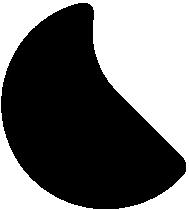
• Extension of environment-focused learning spaces on both campuses including completion of Stage 1 of Dover Green Heart and installation of recycling centre on East
• Marine conservation learning initiatives installed on both campuses
• Initiation of sustainability mapping project
• Focus on systems thinking, including professional learning for teachers
A strong College community, based on shared values, is fundamental to our success. Our community members will demonstrate respectful attention to diverse needs and perspectives, and compassionate engagement with others.
We seek to promote the educational significance of UWC residential life and will seek to harmonise the best of the day and residential experiences. We will strengthen relationships with one another, between campuses and with those outside our immediate community of students, staff and parents. We will build strategic relationships that extend our reach and deepen our impact. We will intensify the focus of the UWCSEA Foundation, enhance Alumni engagement, and continue to dedicate an agreed percentage of our annual turnover to scholarships.
Our fundamental responsibility to our community members is to keep them safe, well and secure at all times and in all situations. We will continue to develop robust safeguarding practices, and empower our community to identify and respond to safeguarding situations. We will implement policies, practices and programmes to support staff and student wellness and safeguard everyone in our community.
Key developments during 2020/2021 year:
Strategy C1: Strengthening our Community
• Adoption of new values after Values in Action review; began work on Community Agreements
• Implementation of recommendations of external Residential Boarding programme review
• Community engagement plans implemented in partnership with parent community groups
• Implementation of alumni internship programme
Strategy C2: Keeping People Safe and Well
• Campus visitor management and safe work processes adapted to COVID-19 requirements
• Continued focus on extending Activities programme through term-time and holiday enhancements
• Investment in staff and student wellbeing programmes and initiatives
• Policies, protocols and practices for Work From Home developed and implemented for administration staff
• Professional learning programme in support of College Safeguarding policy and practices extended to all associated staff
UWCSEA puts people, not systems, first. Our plan for sustainable growth will be transparent and support our community, while reflecting and responding to current realities and future possibilities. We will guarantee the financial security of the College while balancing present and future educational, environmental and organisational needs.
In order to retain education as our focus, we recognise the necessity of humane, sustainable and effective systems.
We will develop operational systems that set a positive, data-informed culture around rigorous practices, adhering to all external regulatory requirements. In adapting to any changes, we will support our community and protect the College’s ethos and values.
We will establish decision-making processes and leadership structures that enhance operational effectiveness while retaining flexibility to adapt to changing circumstances.
Key developments during 2020/2021 year: Strategy S1: Ensuring Long-term Financial Sustainability
• Investment sub-committee implemented process of reviewing management of College reserves
• Reconstruction of Science Block on Dover Campus following a fire
Strategy S2: Embedding Effective Systems
• Launch of new website, portal and communication platforms for staff and parents
• Launch of online procurement system
• Commenced review of application management systems
• Review of EAL application review processes to create alignment with strategy
Strategy S3: Establishing Effective Decision-Making Structures
• Recruitment of Head of Risk and Safety
• Commenced UWCSEA Foundation renewal project
• Establishment of Tender Evaluation Committee

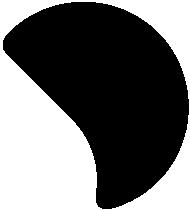
• Streamlining of College policies management and review process
• Continued progress on Constitutional Review by working group

“By inviting our learners to think at the conceptual level, we enable them to apply their ideas to new situations. This allows students to understand how their learning is relevant to their lives both now and in the future.”

Our goal is to educate individuals to embrace challenge and take responsibility for shaping a better world. In order to prepare our students to meet this ambitious goal, our holistic learning programme has been deliberately designed to encompass five interlinking elements: academics, activities, outdoor education, personal and social education and service. These elements combine to provide our students with a values-based education that develops them as individuals and as members of a global society.
Through the learning programme, students develop disciplinary knowledge, skills and understandings alongside the skills and qualities of the UWCSEA Learner Profile. Opportunities to develop the skills and qualities identified in the UWCSEA Learner Profile are embedded in all five elements of the programme. Where a meaningful connection is made, intentional development of a specific aspect of the UWCSEA Learner Profile is explicitly linked to the associated benchmark, indicating the profile skill or quality that is being developed. These are used in our communication to teachers, students and parents.
In 2020/2021, the competencies identified in the previous school year through a Learning Programme review conducted by the Learning Leadership Team were agreed in consultation with staff and the wider community and have been embedded in the UWCSEA Guiding Statements.

Mission competencies are actions that demonstrate the knowledge, skills, understanding and dispositions students gain from our learning programme. They emerge when students, and our alumni, mobilize their learning in complex, real-world situations in service of the mission. The competencies reflect both the breadth of our holistic learning programme and the myriad ways that students and alumni can be seen to be enacting the mission:
• Essential Literacies – Critically and creatively integrating and adapting literacies essential to supporting communication and problem-solving in local and global contexts.
• Interpersonal and Intercultural Understanding – Engaging with the cultures, politics and identities of self and others, including the norms and values that underlie one’s actions.
• Peacebuilding – Building peace in local and global contexts.
• Sustainable Development – Engaging with complexity, understanding multiple futures, taking the role of steward and developing sustainable solutions within environmental, social, economic and political systems.
• Self and Community Wellbeing – Building wellbeing in self and others, whilst supporting a sense of connectedness and autonomy.
These mission competencies were used in the development of courses to be offered in the UWCSEA Grade 9 and 10 Programme, several of which were introduced on Dover Campus in the 2021/2022 school year.

The five elements of our learning programme complement each other to create a whole that is greater than the sum of the parts. This is a carefully planned and purposeful process, where students develop understanding in disciplinary and interdisciplinary ways. For example, students gain deep disciplinary understanding in our academic programme, which may be applied in outdoor education or service when students encounter and grapple with real world situations.
The case studies included in this section of the report were selected to illustrate the learning taking place across the College, highlighting both the concept-based nature of the curriculum and the intentionally interconnected nature of the five elements of our learning programme.
Linguistic diversity is an important part of how the College understands diversity; deliberate consideration of a students linguistic profile helps to inform our admissions decisions and the multi-year programme to expand and enhance the College’s language frameworks made further progress in the 2020/2021 year.
In 2020/2021, the review of the languages policy resulted in an agreement between the campuses of a shared Languages Philosophy and Policy, and further action to communicate these shared definitions and to embed understanding across the community about the extensive and nuanced languages programmes offered by UWCSEA took place.
The cross-College Language Philosophy aims to ensure that, as far as possible, the diversity of languages spoken by our students are valued and utilised in learning, and that there are adequate opportunities for students to maintain and develop these languages. The focus of the work this year therefore remained on becoming a more inclusive and interculturally competent community and building capacity in staff, resources and facilities so that speakers of languages other than English in our UWCSEA community are encouraged to maintain and celebrate their home language and culture. You can read more about these efforts in the Academics and Personal and Social Education pages of the Student Achievement section report, as well as in the Community section.
During the 2020/2021 school year, curriculum development for a new UWCSEA First Languages course for Grades 9 and 10 was completed; details can be found in the Academic section of this report. Further initiatives to support students across the school took place; a language survey for incoming Infant School students was extended to include all incoming students, and a linguistic landscaping project was planned. Artwork and translated signage, which was created in a collaborative project involving students, language teachers and both campuses facilities committees, was installed during the 2020/2021 end of year holiday.
This focus on supporting students’ first language development has seen far reaching and long term programme development, and the strengthening of initiatives such as the previously reported Home Languages Programme (HLP), which supports learners as young as K1 to maintain their home language through lessons in small classes with a qualified teacher.
In 2020/2021, the HLP on East Campus further developed to include:
• Community Languages Programme for staff and parents who want to learn or develop a language and understanding of the cultural norms and customs of a linguistic group and who are beginners in the language
• Foreign Language and Culture Programme (FLCP) for students in Grades 2-12 who want to learn the language and culture of a linguistic group, and are beginners in the language
As the College commenced its new school year with uncertainties regarding the ability of families and students to obtain entry to Singapore (whether via relocation or when returning from holidays) the need to provide learning continuity and a smooth start to the school year became a more pressing priority as the uncertainties created by the pandemic wore on.
The two overall guiding principles for the College’s response to the challenges of COVID-19 response and the need to support students (and their families) who had to commence the year in remote learning were:
• provide continuity of education for students, applying best practice in remote learning, while continuing to adapt and change according to student, parent and teacher feedback
• prioritising providing emotional support and mental health initiatives, while ensuring the sustainability of the College for future generations
As the challenges of responding to the needs of remote learners who were scattered throughout the globe became apparent, the College leadership ensured staff and students were able to continue learning by putting in place measures to resource and support the community. This included hiring a number of additional teachers, creating a permanent pool of relief teachers to provide support for students not yet able to come to Singapore, as well as provide continuity for students in the school should their teachers become ill or need to travel for compassionate reasons.
When students and families arrived into Singapore, the online support became a transition programme designed to help students settle into their classrooms and campus, and for families to join our school community.
In this report, each of the elements of the learning programme contains a highlight story on the College’s operational response to in the challenging conditions created by the uncertainty of the global pandemic.

Through our Academic programme, students develop intellectual habits and passions that stay with them for life. Learning goals in languages, mathematics, sciences, the Arts, humanities, technology and physical education build logically through each grade, preparing students for the next academic challenge and for life beyond school. The conceptual nature of our curriculum, which focuses on ideas that can transfer across the world, supports students who are joining us from different countries, educational systems and backgrounds. For example, while the content of a chosen text in English or a specific time period in History may vary between educational systems, the concepts that underpin that subject area remain the same. The learning is therefore transferable between systems.
Across the College, our linguistic diversity encompasses speakers of 88 different languages and reflects the deliberate diversity created through our admissions policy. Nearly 60% of the UWCSEA community are multilingual, communicating in two or more languages at home. In a continuation of the work identified by the UWCSEA Strategy, the College continued to focus on providing greater support for linguistic diversity, by extending strategies to support bi- and multilingual learners on each campus.
Alongside Grade 9 and 10 programme development for a new English course, curriculum development in the Dover High School focused on a new first language course for Grade 9 and 10 students. Co-created by first language teachers, the academically rigorous and mission-aligned First Languages course launched in August 2021, providing an option for first language learners in the Dutch and Swiss German programmes on Dover Campus, as well as French, Japanese and Korean first language learners to continue academic study of their first language, and to prepare for Language A in the IB Diploma. The decision of Cambridge International Examinations board to discontinue IGCSE First Language courses provided the initial impetus for the College to create this bespoke first language course. The result is a course for our first language students that not only better prepares them for their IB language courses, but allows us to develop a more academically rigorous and explicitly mission-aligned course.
The UWCSEA First Language Grade 9 and 10 course is organised into six core units, which are common across all languages. The two skills-based foundational units, covering linguistic and literary competence, are integrated with the remaining four units which are organised around the themes of identity and language, culture and contexts, sustainability and environmental issues, and global citizenship. All students work to attain the same conceptual understandings and skills, but do so through learning in their own first language.

2021 574 (Dover: 318 | East: 256) 99.5% 89.0% 39.4 33
2020 570 (Dover: 329 | East: 241) 100% 79.1% 38.0 29.9
2019 561 (Dover: 319 | East: 242) 98.8% 77.8% 36.8 29.7
2018 572 (Dover: 318 | East: 254) 97.9% 78.2% 36.2 29.8 2017 572 (Dover: 325 | East: 247) 98.4% 78.4% 36.7 29.9

Below is a list of universities that UWCSEA students were accepted to between 2019 and 2021.
Australia
Australian National University James Cook University Monash University
Royal Melbourne Institute of Technology University of Melbourne University of New South Wales University of Queensland University of Sydney University of Tasmania University of Western Australia
Austria
University of Natural Resources and Applied Life Sciences Vienna
Canada Concordia University Dalhousie University McGill University OCAD University Simon Fraser University University of British Columbia University of Calgary University of Guelph University of Montreal University of New Brunswick University of Toronto University of Victoria University of Waterloo Western University
Denmark
Aarhus University
Estonia University of Tartu Fiji
University of the South Pacific France
College Universitaire de Sciences Po INSA Lyon Paris College of Art
The American University of Paris
Hong Kong
Chinese University of Hong Kong
The Hong Kong University of Science and Technology University of Hong Kong
Italy
Instituto Marangoni Politecnico di Milano San Raffaele University Rome Universita Bocconi Universita Di Bologna
Ireland
National University of Ireland, Galway
Royal College of Surgeons Trinity College Dublin University College Dublin
Israel Tel Aviv University
Japan
Hitotsubashi University International Christian University Keio University
Keio University Shonan Fujisawa Campus
Osaka University Sophia University Temple University Japan Waseda University
Netherlands
Amsterdam University College Delft University of Technology Erasmus Universiteit Rotterdam
Erasmus University College
Leiden University College The Hague Maastricht University
The Hague Pathway College Universiteit Leiden Universiteit van Amsterdam University College Maastricht
University College Twente University College Utrecht University of Amsterdam University of Groningen University of Twente Utrecht University
New Zealand
Victoria University Wellington Philippines
Ateneo de Manila University
Qatar
Northwestern University in Qatar Singapore
LASALLE College of the Arts
Nanyang Academy of Fine Arts Nanyang Institute of Management Nanyang Technological University National University of Singapore Yale–NUS College
Spain
ESADE Business School IE University Madrid Campus
South Korea
Korea Advanced Institute of Science & Technology
Seoul National University Yonsei University
Sweden Lund University Switzerland
École hôtelière de Lausanne Glion Institute of Higher Education Les Roches Schools of Hotel Management
United Arab Emirates New York University Abu Dhabi
Arts University of Bournemouth
Bath Spa University
Bristol, University of the West England Brunel University of London Cardiff University City University of London Durham University Edinburgh Napier University Goldsmith’s, University of London Imperial College London Institute of Contemporary Music Performance
King’s College London
Liverpool Institute for Performing Arts London School of Economics and Political Science
London South Bank University Loughborough University Manchester Metropolitan University Newcastle University Norwich University of the Arts Nottingham Trent University
Queen Mary, University of London Royal Conservatoire of Scotland Royal Holloway, University of London Royal Northern College of Music Royal Veterinary College School of Oriental and African Studies, University of London
SOAS University of London St. George’s, University of London Swansea University
Trinity Laban Conservatoire of Music and Dance University College London University of Aberdeen University of Bath University of Birmingham University of Bristol University of Cambridge University of Dundee University of East Anglia Uea University of Edinburgh University of Exeter University of Glasgow University of Gloucestershire University of Greenwich
University of Kent University of Leeds University of Leicester University of Lincoln University of Manchester University of Oxford University of Reading University of Southampton University of St Andrews University of Sussex University of The Arts London University of Warwick University of Winchester
United States
Amherst College Babson College Barnard College
Bentley University Berklee College of Music Biola University Boston College Boston University Bowdoin College Brandeis University Brown University Bucknell University California Institute of The Arts California Polytechnic State University, San Luis Obispo Carleton College
Carnegie Mellon University Case Western Reserve Case Western Reserve University Chapman University Claremont McKenna College
Clark University Colgate University College of the Atlantic College of the Holy Cross
Colorado College
Colorado State University Columbia University Columbia University In the City of New York
Connecticut College Cornell University
Dartmouth College
Dartmouth University Davidson College
Drexel University
Duke University
Embry-Riddle Aeronautical University
Emerson College
Emory University
Fordham University
Franklin and Marshall College
Furman University
George Washington University
Georgetown University Georgia Institute of Technology
Gettysburg College Harvard University Harvey Mudd College Haverford College
Indiana University at Bloomington Johns Hopkins University Kenyon College
Lake Forest College
Loyola Marymount University Luther College Macalester College Massachusetts Institute of Technology Methodist University Miami University-Oxford Middlebury College Minerva Schools at KGI
Mt Holyoke New York University
Northeastern University
Northwestern University
Oberlin College
Occidental College
Ohio State University
Parsons School of Design Pennsylvania State University
Pitzer College
Plymouth College of Art Pomona College
Pratt Institute
Princeton University Purdue University
Rensselaer Polytechnic Institute Rhode Island School of Design
Rice University
Ringling College of Art and Design
Rochester Institute of Technology
San Diego State University
Santa Clara University
Savannah College of Art and Design School of the Arts Institute of Chicago
Skidmore College
Smith College St. Lawrence University St. Olaf College Stanford University Swarthmore College Syracuse University
The College of Idaho
The New School, Parsons School of Design
The University of Texas at Austin Trinity College
Tufts University University of Arizona University of California, Berkeley University of California, Davis University of California, Irvine University of California, Los Angeles University of California, Riverside
University of California, San Diego University of Chicago
University of Colorado Boulder University of Denver University of Florida University of Hawaii At Manoa University of Illinois at UrbanaChampaign
University of Maine
University of Maryland, College Park University of Massachusetts-Amherst University of Michigan University of Michigan-Ann Arbor University of Nevada-Reno University of North Carolina At Chapel Hill
University of Notre Dame University of Oklahoma University of Oklahoma Norman Campus
University of Pennsylvania University of Richmond University of Rochester University of San Diego University of San Francisco University of Southern California
University of Virginia
University of Washington University of Washington, Seattle Campus
Vanderbilt University Vassar College
Wellesley College Wesleyan University
Wheaton College Massachussetts Williams College
Worcester Polytechnic Institute Yale University
At UWCSEA, we strive to develop both intercultural understanding and communicative competence in our students. We also know how important it is for students to have a strong first language for learning and wellbeing.
Because English is the lingua franca of our community and we are an English-medium international school, our challenge is to ensure we are proactive in supporting our bi- and multilingual learners to build and develop the vital connection to their culture through their home language. Particularly as we are now at a point where the number of families in our community who report they speak a language other than English at home suggests that speakers of English-only at home are in the minority.

Our focus on better supporting a students’ first language development has seen far-reaching long term programme development, through initiatives such as the Home Language Programme (HLP), as well as the expansion of the English as an Additional Language programme to welcome students from K1 onwards.
Starting in the Infant School last year, we began surveying all incoming families about their child’s language profile so that we can, where possible, place incoming students in the K1 cohort with a ‘language buddy’ in their class. Whether the student speaks English fluently or not, the presence of a peer who speaks the same home language can be leveraged by the class teacher to help our youngest learners to retain their home language skills – and their self confidence and identity – by providing them with opportunities to use, and reinforce their learning, in their home language.
This school year the College extended the language survey to all families, so that we can better understand our students’ linguistic profiles and the aspirations and goals that parents have for their child’s linguistic development while at UWCSEA. This survey data will help to inform future planning for language provision and teacher recruitment.
For individual students, it means class teachers will be able to identify opportunities to encourage students to utilize their dominant language to support their learning when planning lessons. This ‘translanguaging approach’ is not delivered as a whole class lesson to all students. Rather, it is an intentional strategy that teachers draw on as necessary in personalising the classroom experience for each student, helping them play to their strengths by allowing them to access and process their learning by using their home language. This enhances their conceptual understanding of the subject, by helping students to maintain and develop their academic knowledge in, and of, their home language.
Further work included extensive examination of the K–12 learning goals for literacy with a specific focus on students’ English language awareness and development within the English and English as an Additional Language curricula. To support learners whose first language is not English, the languages review enabled leadership teams to identify goals in acquiring the skills and strategies required to listen, speak, read and write in English with nuance and sophistication. In the College’s Languages Other Than English programmes, regardless of the level of language acquisition, these learning goals were also articulated at the appropriate level for learners.
We also undertook some exciting First Language curriculum development work this year in the Dover High School, as reported in the strategic development outlined earlier in this section. And what about monolingual students? Well, the good news is that research has shown that there are immense benefits for all members of a community who implement positive approaches to bi- and multilingualism. In this environment, our monolingual students develop greater cross-linguistic awareness and intercultural understanding, which in turn supports their development as bilingual learners of a new foreign language.
A vital part of student life and learning, our multifaceted Activities programme provides students with opportunities to explore new interests, develop their strengths and pursue their passions.
Students can do this through existing activities, led by staff who are keen to share their interests and support students in their development, or by finding like-minded peers to join them and approaching staff to help identify a supervisor and to add the activity to the seasonal sign-up so that they can lead the activity. This provides opportunities for students to interact with students from other grades and parts of the school.
Founded on the notion of breadth of opportunity, our intentionally diverse programme provides students with opportunities to develop and to enjoy success beyond the classroom as they create connections throughout the community on campus. Choice is a key principle of the programme. Organised around four ‘seasons’ students have opportunities to sign-up for individual seasons or make year-long commitments, depending on their interests.
One of the benefits of the scale of UWCSEA is the sheer number of options we are able to offer students. The chart below shows the average number of activities that students in each grade take throughout the year. It indicates that students in all grades are taking full advantage of the offerings from the Activities programme.
During the 2020/2021 school year, the College remained committed to continuing to provide a range of activities for students. The complexities of COVID-19 safety measures, with sometimes last minute notice to changes in rules and safety requirements meant that the provision of many of the activities offered in the programme were impacted; in particular in the period of homebased learning. However, the contribution of continued connection and pursuit of individual interests is critical to student wellbeing and the operational challenges of continuing to offer the activities programme were addressed with student wellbeing as a top of mind consideration.
While all sports competitions, regional tournaments and student conferences were halted for the school year, students were encouraged to pursue fitness goals and our focus shifted to ensuring students remained engaged in teams and programmes.
Many students were able to continue to engage in this element of the learning programme, despite the challenges, and were also engaged in the holiday programmes which were organised during the majority of the school holiday breaks.

The Activities programme intentionally supports the foundations of a lifelong active and healthy lifestyle, by enabling students to engage in pursuits that support their wellbeing, and by providing opportunities for leisure and mindful engagement with the world around them. This is in alignment with the intended learning outcomes defined by the Personal and Social Education curriculum.

Over the past several years, perhaps accelerated by the curtailing of sports fixtures and regular competitions as a result of COVID safe management measures, the College has been internationally creating a further shift towards providing students of all ages and ability levels with multiple opportunities to participate for enjoyment and skill development, rather than simply preparing students for sports fixtures through team selection and training.
By encouraging students to continue active participation, and offering skill-based training rather than fixture focused preparation, both campuses have seen students commit to extended participation, with less intensity and more reported enjoyment. Athlete development pathways are available for those who are seeking to further their commitment, and are looking to engage in representative fixtures and pursue opportunities for competitive participation as these opportunities resume. When fixtures return, students and coaches will enjoy the excitement these bring, but the COVID-accelerated refocus for coaches and students has supported the College to reframe sport and fitness activities in a more holistic way.
Sports, Fitness and Wellness
Participation by season Season 1 Season 2 Season 3 Season 4
Dover Campus
1,536 1,468 1,394 1,455
2,292 2,468 2,281 2,217 East Campus
Throughout the 2020/2021 school year, the community (after school weekday and weekend) and school holiday programmes offered by the campuses continued to evolve.
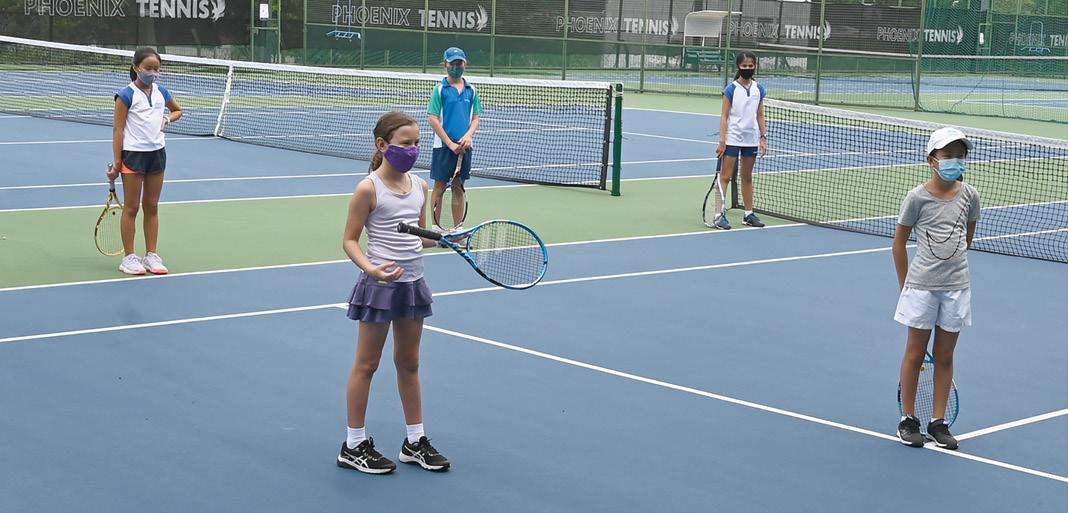
In response to increased demand, and in order to provide consistent year-round access to a full range of sports and other programmes, the College has continued the work of the 2019/2020 school year to build additional in-house capacity in coaching and development for a number of sports. In future new programmes will also make use of campus facilities to expand into STEM and Arts programmes, which will be open to the community beyond UWCSEA.
On Dover Campus a number of additional previously externally provided sports have been moved into the College-run community programme, including football, rugby, volleyball, badminton, softball, hockey, cricket and climbing, and the creation of a health and performance programme for athletes. On East Campus, this saw the addition of netball, volleyball, badminton, cricket as well as creation of performing arts and baking clubs.
Dover Campus
Tennis CAP
Aquatics CAP
Gymnastics CAP
Football Phoenix Club Football CAP
Heath and Performance CAP
Rugby CAP
Softball Phoenix Club
Karate Phoenix Club
Volleyball Phoenix Club
Badminton Phoenix Club
Climbing Phoenix Club
Basketball Phoenix Club
Hockey Phoenix Club
Cricket Phoenix Club
* CAP = Community Activity Programme
*
East Campus
East Badminton Club
East Volleyball Club
East Cricket Club
East Softball Club
East Weekend Performing Arts
East Netball Club
East Bakabee Programme
CFCIDC Football
Swimming
Gymnastics
Both campuses continued to enjoy increased participation in debating and Model United Nations activities throughout the 2020/2021 school year, with numbers of individual students participating increasing and both campuses actively providing student development pathways from Junior School on.
This included significant opportunities for High School students to mentor younger peers by providing guidance and feedback as students prepared for participation in the their first MUN conferences.
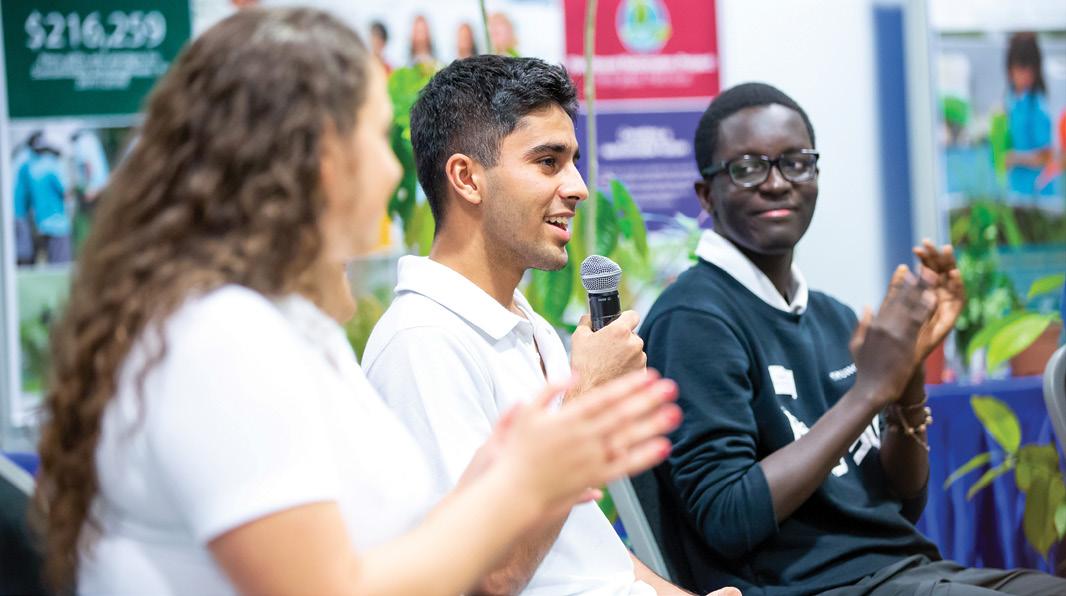
In 2020/2021 the aim was to establish innovation as a focus of creative community engagement and entrepreneurial student activity across the campus. Under the umbrella of UWCSEA East Innovation, a range of existing student initiatives were brought together and nurtured, and a number of new ideas were explored or expanded.
While the longer term may see the establishment of a dedicated Innovation Lab on East Campus, for the moment the focus is on supporting students to take their original concepts from ideation to launch - in essence, using their ideas to create solutions to realworld problems and needs within their own community as they are empowered to create innovative products, services and systems.
As part of the Maker Community initiative under UWCSEA East Innovation, the Junior School now enjoys a tinkering area in the Grade 4 and 5 shared pod space, providing students with daily access to hand tools and recycled materials, encouraging their creativity and STEM skills.

•
•
•
•
•
•
•
• Augmented Reality
•
•
•
•
•
• Coding
• Social Startups
• Internet of Things
• Smart City
• eWaste
Innovation initiatives at UWCSEA support students to take their original concepts from ideation to launch, learning from both their successes and mistakes as they are encouraged to develop an entrepreneurial mindset as they seek opportunities and possibilities to:

• make the world a better place
• design products, services, and systems of value
• reduce our impact on the planet
The IDEAS Hub at Dover and the newly established Innovation@East ecosystem encourage students of all ages to internalise an innovator’s mindset, think critically and to connect and collaborate with their local community as they seek to create solutions to real-world issues. The infrastructure is used extensively in the academic curriculum by students of all ages, as well as supporting students to pursue interests and ideas through the Activity programme. This year, we were pleased to host the Smart City Programme and Challenge at the IDEAS Hub, and see the development of UWCSEA East Innovation, which supported a successful student-led team to enter the global First Robotics Competition.
In February and March 2021, UWCSEA hosted the Smart City Programme and Challenge in partnership with Hyundai Motor Company and Kia Corporation (HMC/KIA). Over 40 High School students from both campuses took part and the programme kicked off with a six-hour interactive lecture series delivered by experts, addressing themes of new mobility solutions, cleantech, energy, new smart services and smart infrastructure in relation to smart cities.
Culminating in a hackathon on Saturday, 27 March at UWCSEA’s IDEASHub, students formed 11 teams to create a valid business case on a smart city topic of their choice, supported by HMC/KIA and UWCSEA staff. A panel of experts judged the final projects with students competing for prizes generously supplied by HMC/KIA.
The combination of a lecture series and hackathon gave students real insights and practical hands-on experience about how technology is changing the world around them and how to develop viable solutions for the future. Congratulations to all students who took part. Thank you to our partners at HMC/KIA for helping to deliver this programme for our students.
The student teams who placed in this competition presented the following ideas:
• SocioPonics, a modular, smart, affordable, and configurable hydroponic unit to promote social gardening and provide smart communities with clean and healthy sources of nutrition
• Smart Fitness, new workout experience through smart technology and infrastructure
• Optimisation of tree distribution, using data analytics to optimise planting outcomes
Wall-East #8540 was formed by a group of students with a passion for building robots, with the aim of sharing their enthusiasm and promoting STEM in our communities through participation in their first year of the FRC.
During the summer of 2020, several team members participated in a skill-building session in Java programming and Fusion 360 (computer-aided design software) organised by FRC team Elev8 from Dhirubhai Ambani International School in Mumbai, India. They also joined webinars where they learnt how to approach the school, conduct outreach, and about the design and development process for building their own robot. The students took these ideas to their teachers and in late August registered a team – 10 members in construction, 15 in programming, and 6 in outreach – and began what was a successful rookie year. Team WallEast #8540 completed construction of a robot, competed in several challenges, collaborated with other teams, and conducted outreach within the East Campus and Singapore schools community. All the hard work paid off when the team was awarded the FRC Rookie Game Changer Award in the pacific region, and Team Captain Vedant earned the Dean’s List Award across the pacific region.
UWCSEA East Innovation and the IDEAS Hub were established through the generosity of community donors.
The Outdoor Education programme is a powerful part of the UWCSEA experience, providing students across the school with opportunities to develop the UWCSEA Learner Profile qualities of resilience, commitment to care, self management, communication and collaboration.

While the demands of response to the pandemic have necessarily disrupted the travel to individual destinations and delivery of the programme in overseas destinations, the Outdoor Education programme continued in 2020/2021.
The College’s commitment to the provision of an exceptional Outdoor Education programme by employing a team of full time specialist staff meant that the College was well-resourced to plan an extensive hyper-local programme in collaboration with curriculum leaders. Through a process of strategic planning with members of the curriculum teams across the school sections, synergies between the Outdoor Education curriculum and other elements of the learning programme were strengthened. In keeping with the Colleges approach to place-based learning, this also provided opportunities to identify where better use could be made of existing campus facilities and equipment, and of Singapore-based locations.
Staff across the Outdoor Education team, together with educational leaders and teachers worked tirelessly to provide students in Primary and Middle School with alternative campus- and Singapore- based programmes. These were carefully designed to deliver the learning outcomes identified in the UWCSEA Outdoor Education curriculum, developed in line with the intentional foundation of the four K-12 standards defined by our written outdoor education curriculum. The four standards are:
1. Personal Identity
2. Healthy relationships
3. Connectedness to Nature

4. Expedition skills
While camping overnight remained outside of the safe management measures required in response to COVID-19, all Junior School students were immersed in a bespoke ‘Camp on Campus’ programme, designed and run by the Outdoor Education Specialist educators in conjunction with classroom teachers and other staff. The programmes provided students ways to access the four intended learning outcomes of the outdoor education curriculum, as they engaged in many activities that would have taken place on the more traditional expeditions of pre-COVID. In safely distanced groups, students had the opportunity to build shelters, learn about water filtration and edible plants, explore areas of campus previously unfamiliar through wayfinding activities, and to learn outdoor skills such as fire making and camp cooking.
While Outdoor Education may have been one of the elements of the UWCSEA learning programme most impacted by enforced operational changes, the pandemic has provided an opportunity for the College’s team of Outdoor Education professionals to focus on creating greater links to the other elements of the learning programme, and to explore creatively the opportunities for learning available on our own campuses, and within Singapore. In the 2020/2021 year, the team continued to develop ways in which students could meaningfully access the learning goals of the Outdoor Education element of our learning programme in Singapore and on-campus contexts.
This was a natural extension of some of the work already underway, which focused on creating greater integration across the elements of the learning programme, better utilising or enhancing the existing campus facilities and equipment, and to creating meaningful alternatives to regional travel should environmental conditions, such as haze, require alternative plans to be enacted.
For the Primary School, this meant a series of ‘Outdoor Education’ weeks, where classes were immersed in a series of on-campus activities which mirrored many of the experiences and learning opportunities that they would have had on their overnight expeditions.

Similarly the Middle School programmes designed by the Outdoor Education team began to extend student learning by using and enhancing facilities already on campus, and creating opportunities to explore less well known areas of Singapore. On East Campus, abseiling equipment were installed in the Infant School stairwell, and after extensive testing and safety certification, Grade 8 students were able to have a day of experiences on campus even as their off-campus activities were curtailed due to newly introduced safe distancing measures at the end of Term 3. New partnerships and locations within Singapore were also explored, such as the Green Corridor walks and Ground Up Initiative, allowing the College to create further opportunities to extend student learning in place.
The Foundation IB programme expedition became an on-campus week of team building and exploration with some Outdoor Education skills-based learning. Our case study in this section describes this programme, which, with two years of data in the longitudinal outdoor education study now collected, shows a positive effect on student wellbeing and learning outcomes.

The opportunities for learning in the Outdoor Education programme bring learning beyond the classroom, by immersing students in experiential challenges that build resilience, collaboration, communication and leadership. These, together with the important opportunities to connect to nature and learn more about the interconnectedness of the environment in which our students live and learn.
Students joining the College in Grade 10 for the Foundation IB course have always had an expedition focused on outdoor challenges and service learning scheduled early in their time at the College. The timing provides this small cohort of incoming High School students with an opportunity to get to know each other, to build relationships and connections that will support them while settling into the wider High School and to give them understanding and first hand experience of the UWCSEA learning programme.

The FIB programme and dedicated expedition, which sees the campus-based cohort brought together at the start of the school year, has always been designed as a way to immerse our new Grade 10 students in the UWC ethos from day one of their time at UWCSEA. As a result, the five days of the bespoke hyper-local FIB programme were themed around creating connection to:
1. each other and the UWCSEA Learner Profile
2. the UWC mission
3. UWCSEA and the school community
4. nature
5. Singapore
In 2020/2021, the FIB adventure week was no different, taking place in mid September, with a week of off-timetable activities and challenges designed to immerse students in the UWC spirit. Fittingly, the week started on UWC Day for our 2020 cohort, as they were welcomed to campus for a day of team building challenges - all in safe-distanced groups. Students took part in ‘microadventures’ on campus, reflective activities such as creating ephemeral art with found objects, and team building activities such as rock climbing.
Later in the week, students were engaged in further outdoor education skill building, including crate stacking in the Main Hall on East Campus and the High Ropes course on Dover Campus. A popular part of the programme were the kayaking experiences swimming pools using the fleet of single person kayaks. While students learned the basics of kayaking, they also participated in games and individual challenges designed to strengthen both water skills, teamwork and connection.
Other team-building activities throughout the week included treasure hunts, gardening, cooking and overnight homework aligned with the UWC mission, such as bringing in plant based packed lunches with no single-use plastic. These activities were designed to equip students with skills, and to provide them with greater understanding of the skills and qualities of the UWCSEA Learner Profile.
Importantly, students were also focused on UWCSEA’s mission for peace and a sustainable future through activities which helped them to understand the UN sustainable development goals and the systems in which they operate. This was designed to provide students with a way of gaining greater depth of understanding in the links they would find in the academic curriculum later in the year. For example, the final FIB Science unit on East Campus challenges students to act as a consultant for a ‘teacher-client’ looking to reduce their carbon footprint. Students interview a client, and then research and present their recommendations through a range of different media, highlighting lifestyle adjustments so as to reduce their clients carbon footprint based on their individual needs.
The Personal and Social Education (PSE) programme helps to ensure that students feel secure and valued. In turn, this provides an effective base that encourages their learning, growth and social development.

PSE underpins our entire programme, and is informed by both our mission and our Singapore context. It supports our international student community so that they feel truly valued by the adults who are leading their learning. The intent is that they can continue to grow in self-awareness, gaining an understanding of themselves and how they interact with those around them so as to develop effective and open-minded responses to personal and cultural differences.
Time is dedicated each week for the intentional delivery of this important part of the student experience. However, student welfare is not limited to the allocated PSE time with their classroom teacher/mentor. Student welfare is also encompassed by safeguarding, learning support, wellness centre and counselling support, university advising, Heads of Grade, Vice Principals and Principals in supporting social and emotional needs of students.
While all members of staff have a responsibility for the wellbeing of students, the learning support and wellness and counselling teams are central and work closely with teachers to ensure that students are supported both within and outside of the classroom.
The PSE curriculum content is classified in three overarching concepts:
1. individual wellbeing
2. relationships and community (interpersonal wellbeing)
3. student ability to engage with global issues (global wellbeing)

In 2018, the UWCSEA Strategy identified diversity and inclusion as goals for the strategic development of the College. As a result, from 2019/2020, UWCSEA embarked on a three-year project to build teacher capacity to assist students based on their individualised learning styles, by investigating how the College can better support neurodiverse students in the learning programme.
The programme, which has been funded by donation to the UWCSEA Foundation, examines how behaviours in the classroom can be linked to differences in how students think and process information. By deconstructing the behaviour they observe in class, teachers can gain an understanding of how best to support the student’s neuro-developmental needs and preferences. For example, a student with an auditory processing issue (who may present as forgetful or disinterested) may need to have instructions written down, in a step-by-step list, rather than receiving instructions verbally or looking at them on a computer screen. Or a student with memory retention challenges (who often forgets their homework), may be helped by using tactile mediums to take notes or remember deadlines.
An initial pilot group, selected from Head of Departments across the Dover High School, were identified in the 2019/2020 year, and in partnership with Learning Support in the Dover High School, a professional learning plan was developed, identifying goals and training plans to implement while working with a core group of students. While COVID-19 interrupted the launch and expansion of the training, it created an opportunity for ongoing virtual training with experienced specialist educator Sylvia Leck, Academic Director of Foundations for Learning, which continued into 2020/2021 with the pilot group and High School Heads of Department completing core training modules by the end of the school year.
Initial positive feedback has supported the continued plans to implement the programme across the next two years throughout the High School, which will be funded through donations to the UWCSEA Foundation. The work is linked to a simultaneous project examining mental health and wellbeing in the High School.
The focus on supporting wellbeing in our community - for students and their families, as well as for staff has been a priority in the 2020/2021 as the pandemic restrictions continued and our international community began to feel the extended separation that were, in many cases, a necessity in the new world of COVID restrictions - both on campus and in the wider world.
Initiatives focused on ensuring that students were able to access peer and teacher-led support initiatives, parents were supported by wellbeing and counselling centre staff through the launch of a podcast exploring topics of interest, and staff were provided with additional access to support.
The College’s strategic commitment to personal wellbeing and peace is woven throughout the five elements of our learning programme, and forms one of the three central pillars of focus with developing the personal and social education programme at UWCSEA. Interconnected elements of wellbeing are also central to the successful enactment of our mission competencies.
At UWCSEA, our holistic, mission-aligned approach to education means that we are continually seeking ways to enhance student experience so as to enhance their learning. And that process starts when students first join UWCSEA in the K1 classrooms, where a deliberate approach to self understanding and acceptance is the beginning of the journey to peacebuilding and community wellbeing.

Excepted from an article in Dunia June 2021, by Andrea Strachan, Infant School Curriculum Coordinator, and Catherine Malone, K1 Grade Level Curriculum Coordinator, Dover Campus
When reviewing our K1 Unit of Study focused on Service at the start of the 2020/2021 year, with COVID safe management measures still in place, we began to realise that this component of our place-based learning programme, built around hosting the students of Child@Street11 for a series of visits to our school, could not be delivered as it had been in the past. We realised that a switch to an online format might not be as powerful, as the Infant School children would not have the opportunity to engage with others “in person”, and the teachers at Child@Street 11 agreed.
With challenge, however, comes opportunity.
The previous year had also highlighted for us the need to be more proactive in terms of speaking about, teaching about, learning about, and taking action regarding issues of Diversity, Equity and Inclusion (DEI). Educators and parents continued to reflect on the emotional processing begun in the 2019/2020 year, when ongoing acts of systemic racial injustice gained headines at te height of the pandemic restrictions in Singapore. We all searched for the right things to say and do, and this reflection continued even as we looked at how we might adjust our learning programme to accommodate the reality of COVID restrictions.
As an internationally-minded community of learners, UWCSEA was already embarked on a journey of both reflection and action in terms of how we are addressing these important issues. An example of how our reflection has resulted in action was the introduction of a K1 language survey for parents to complete prior to the start of school, so as to provide us with more nuanced information on the linguistic profiles of the children coming into our care and classrooms. As educators, we used this information to find new ways of bringing home languages into the classroom, which included deliberately creating language buddies within our classrooms as we created K1 class groups, to support both a feeling of belonging and the development of literacy skills.
As a K1 Team, we also re-evaluated our K1 Service Unit of Study, and took this as an opportunity to consider other ways in which we begin to develop an understanding of “service” that is meaningful and relevant to our youngest learners within this new context. In collaboration with representatives from the Dover Diversity, Equity and Inclusion (DEI) Pod, we decided to develop a pilot Unit of Study framed under the DEI theme of “Peacebuilding”, focusing on the idea that “Peace Begins With Me”. The concept of peace-building, one of the ‘mission competencies’ outlined in our new College guiding statements, understands that peace can’t be achieved without knowing how to appreciate and engage with diversity, and that without understanding how to interact and negotiate with others, it is impossible to engage in meaningful service.
We started this Unit of Study by helping students to further explore the concept of “identity”, focusing on what makes us the “same” and what makes us “different”. We worked with the Primary School Library to curate a collection of books that connected to our DEI topics of diversity, inclusion, identity and belonging. In K1, DEI learning often begins with an appreciation of diversity, celebrating the different people in the room. This is followed by a focus on inclusion, ensuring everyone in the room feels like they belong. Finally, we explore equity by examining the structures we put in place to ensure that diversity and inclusion happen.
The intention was for this Unit of Study to lay the framework in which our K1 students can begin to better understand how to be open-minded and inclusive members of our community, happy and well within themselves, so that they are better ready and able to engage in service to others.
UWCSEA believes in the transformative nature of the experience of serving others and in the responsibility we have to one another and the planet. Our Service learning programme fosters empathy and helps students to recognise that part of being human is seeking opportunities to put yourself aside in the service of others.
While the context of each service interaction is different across our campuses, regardless of campus, grade, classroom or activity, all students are striving for learning in each of the three identified Service curriculum standards:
1. Awareness: by developing, skills and qualities individuals can become determined global citizens who recognise their ability to enact positive change
2. Sustainable Development – Being Able: individuals and groups can plan to engage effectively in the sustainable development of local and global communities
3. Taking Action – Being Changemakers: by taking informed, purposeful action, individuals and groups can act as changemakers, contributing to the sustainable development of local and global communities
The impact of the continued safe distancing requirements on our Singapore service programme has been felt this year, as students have been unable to visit or connect with their partner organisations in person. While our students have taken a creative approach to initiating online connections and keeping the spirit of the service programme alive, in many instances it has not been possible to create ongoing opportunities to connect via online mediums as it is not suitable for our partner clients.
These numbers reflect the service activities offered at lunchtime, after school and on the weekends for all students K–12. In addition to this, all students in Infant, Junior and Middle School students also take part in service learning in the school timetable throughout the school year.
All money raised at the College is independently audited annually. Despite the restrictions on activities and curtailment on opportunities to fundraise caused by the COVID pandemic, collections by College on behalf of our service programme remained strong - a testament to the commitment of our student body and service teams to our partners and our service programme.
Total S$ collected by College for Service Programme
0

During the extended period of safe distancing throughout 2020/2021, many of the residential homes that our students visit regularly were closed to visitors, leaving the clients without in-person visits from family members or friends. As a result, making weekly connections with the seniors online has become even more vital to support well-being in these challenging times, and many student groups pivoted to delivering online Service via video conferencing tools.
They rethought their weekly activities and figured out ways to engage clients online; not a straightforward task, when dealing with differing physical, mental and learning abilities. In many cases, students relied on the staff at the partner organisations to assist with the set-up of iPads and laptops and for feedback about how the new activities were received and what could be improved. Although the loss of in-person interaction was disappointing, students rose to the challenge, and have become comfortable with running online sessions for their partners.

The clients also looked forward to these sessions, perhaps even more so than before. Nikki Goh, Associate Psychologist at long-term East Campus partner APEX Harmony Lodge, noted, “In this time of safe-distancing, residents have really appreciated and looked forward to the online sessions run by the UWCSEA students. When we are able to have sessions in person again, we would like to have both physical and virtual sessions, so we can include more residents, and continue to put to use everything we have learned about technology.”
Arshiya, a Grade 10 student on East Campus whose SUN-DAC service also moved online, reflected, “Initially, with the sudden transition to online Service, our service group were challenged to come up with engaging activities for our clients. Devising inperson sessions that were all-inclusive and fun for all was already challenging. Grabbing our client’s attention online was even harder, and we had to bring a great deal of enthusiasm and work through all the technical challenges. We were challenged to become innovative, creative and better critical thinkers.”
Kate Levy, Head of High School English and SUN-DAC Service supervisor, says,“It has been quite remarkable to hear students independently critiquing and adjusting what they do in the sessions, as they observe the reactions of our buddies and constantly assess whether they are engaged, happy, and learning with us. A steep, deep and powerful learning curve for our students.”

As we look for ways to further embed and accelerate our already extensive commitment to creating a sustainable future, a sustainability workshop on Earth Day 2021 brought together educational and operational leaders from both campuses to share thinking and map our progress. The day served to highlight the many ways in which UWCSEA is already working to fulfil our commitment, and to align with the aims of the UWC climate compact which was announced in the lead up to COP26 in November 2021.
Of particular note at the workshop was a session conducted by sustainability leaders on both campuses, outlining ways that UWCSEA’s learning programme has sustainable development embedded throughout all five elements of the learning programme. The learning is experienced by students through the numerous activities that make up the Service and Sustainable Development programmes on our campuses. Students are connected with opportunities to become aware of the issues and to build a personal changemaker toolkit so that they are equipped to make informed, purposeful action in support of the UN Sustainable Development Goals (UNSGDs). Students are guided in their understanding of the issues and challenges that face those working to address the UNSGDs and are empowered to find and test solutions on campus. On the East Campus, students participate in Sustainable Development initiatives grouped under three broad umbrellas: Conversation, Permaculture, and Zero Waste. Our commitment to accountability for the impact of our physical facilities and operational decisions also began over a decade ago as we launched ambitious multi-year projects to design and build East Campus and to renovate and rejuvenate the ageing Dover Campus. Our industry-leading innovations in technology and green design mean we continue to operate both campuses as Building and Construction Authority (BCA) Platinum Super Low Energy sites. In the 2020/2021 year, as activity off campus was curtailed by COVID safe management requirements, the value of the campuses as educational resources for our students increased exponentially as further opportunities for service and sustainability linked initiatives across campus were identified and trialled by groups of enthusiastic students and staff.
Total number of sustainability-linked and environmental services (Dover)
Total number of sustainability-linked and environmental services (East)
UWCSEA’s Service programme is about providing students with the knowledge and agency to take informed action to help others.
There are many examples of the power of student action and advocacy on display across our campuses - in the gardens, on no drive days, the reduction in single-use plastics, and the solar panels on top of our campuses. There are, however, an even greater number that are just as powerful, even if they are not immediately visible. Here is one example of student advocacy and innovation in action, informed by our service learning programme:

Adapted from an article in Dunia, December 2020, by Frankie Meehan, EAL and TOK teacher and Head of Service, Dover Campus
HER Journey, a project represented by four UWCSEA Dover students, made it to the final of the Young Aurora 2020 humanitarian initiative in November 2020. The achievement was the result of teamwork and an extensive commitment to creating long-lasting change, as the group impressed the judges with their well-researched and strategic response to a complex social justice issue: the rights of foreign domestic workers (FDWs) in Singapore.
”We are an advocacy group,” explains founding member Karen Xinchang Liu. “We aim to educate workers about their rights, but also to cultivate empathy among employers and their children.”
Karen (Grade 12), Callista Walla (Grade 11), Yanda Priyatna (Grade 12) and Yueyang Gue (Grade 10) are among 18 students who took on this challenge. After extensive research and over a year spent building bridges with local NGOs, including Humanitarian Organisation for Migration Economics (HOME) and the Centre for Domestic Employees, the team devised a three-pronged approach: an “Empathy Challenge” card game; a series of “Know Your Rights” videos for FDWs; and an ongoing podcast that spotlights stories from individual FDWs the students have interviewed.
The seeds of the project were sown when Karen did the UWCSEA HOME Cooking service with women from a shelter for maltreated FDWs. “My perspective on the nature of labour rights changed,” she recalls. “After talking with the women, I realised that on top of economic and legal inequality, they face a culturally rooted disdain for their occupation”. That led to the early drafts of the Empathy Challenge, which was later trialled with both FDWs and employers at events on and off campus. “We invited workers and employers to sit together,” says Yanda. “Each took on the other’s real life role. A pair could only win lots of points if they reached a consensus.”
Once HER Journey had been formed, the group reached out to four community organizations and gradually won their trust. “At first, they were sceptical,” says Callista, “but we soon convinced them we were serious. One thing that helped is that we offered to support their existing advocacy agendas instead of creating our own from scratch.”
Since founding, the team conducted interviews with workers concerning their migration and employment journeys. These have provided material for HER Journey podcasts, a storytelling project that features domestic workers’ own perspectives and their advice for peers. That advice takes centre stage in the ‘Know Your Rights’ video series, which shares solutions to common labour rights violations with a larger audience.
Presented by the Aurora Humanitarian Initiative in partnership with UWC International, Young Aurora is open to all UWC schools and colleges and, since 2018, the African Leadership Academy. Its mission is to encourage, support, and showcase student-driven projects which address concrete humanitarian issues and offer solutions through innovative and sustainable approaches. The group were named runners up in the 2020/2021 awards. “We’re not done yet,” said Yueyang. “Five of us are just Grade 9, so we plan to make this project live on. FDWs continue to be denied their rest day and other rights, and depression is on the rise, so we must do everything we can to raise awareness and provide support.”
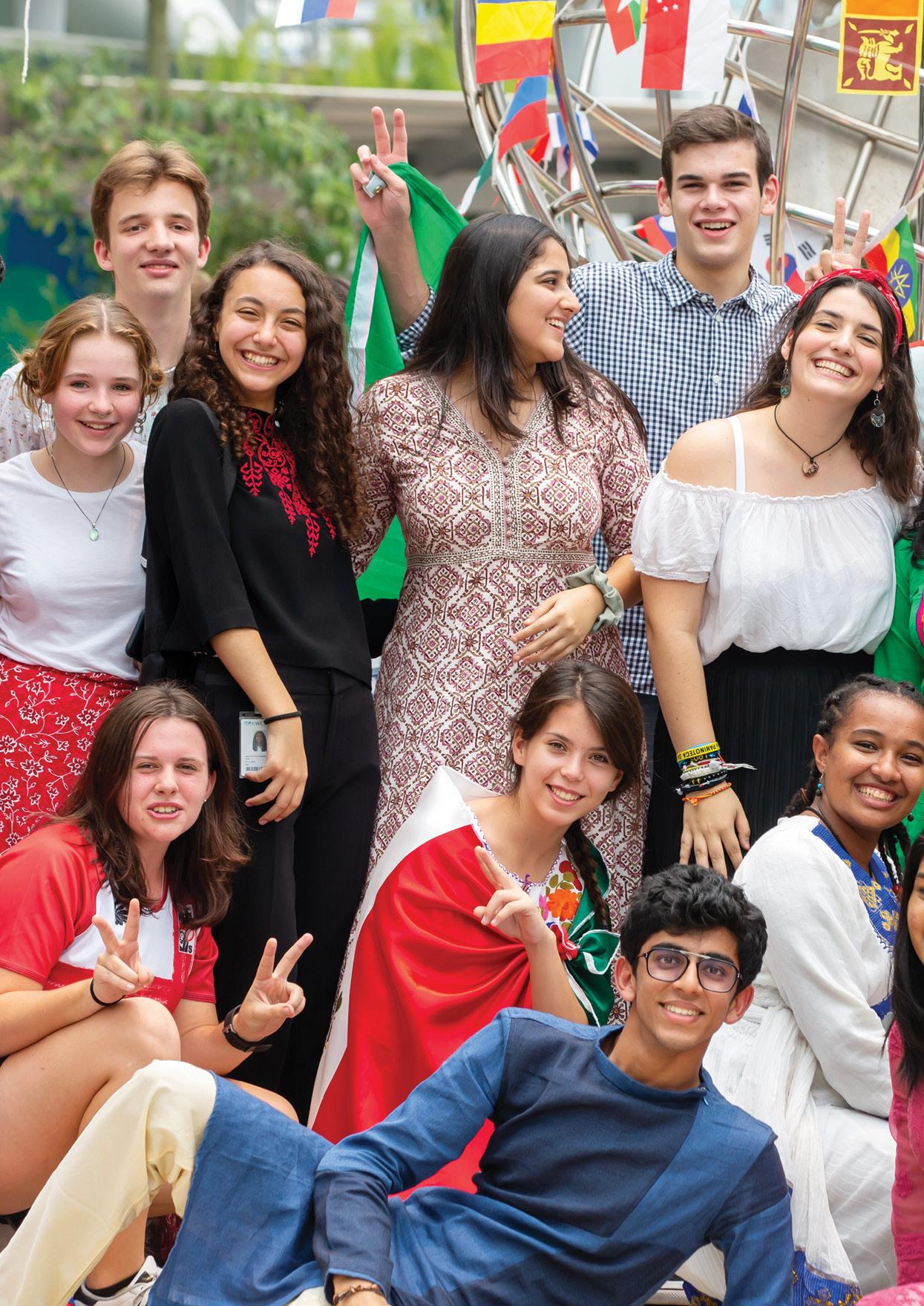
“...the human related subjects that build character, that are able to build empathy, ethical behaviour, empowerment, efficacy, gender equality. For me, these subjects will make the base of what true learning and true education is.”
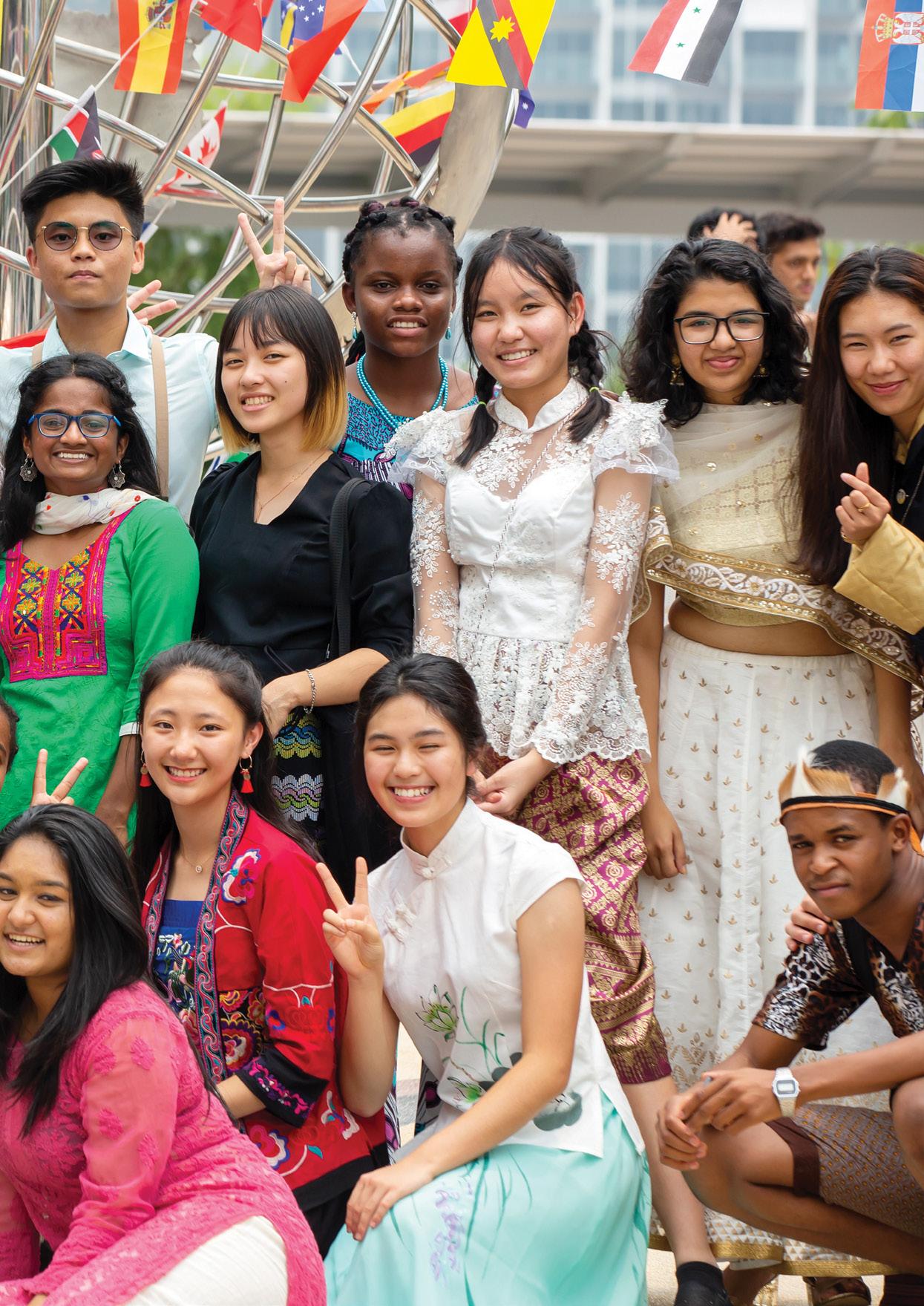
The UWCSEA community is a vibrant, truly international group of students, boarders, scholars, staff, alumni and parents who are united in a common purpose. This section of the report provides some statistics and information about our community.
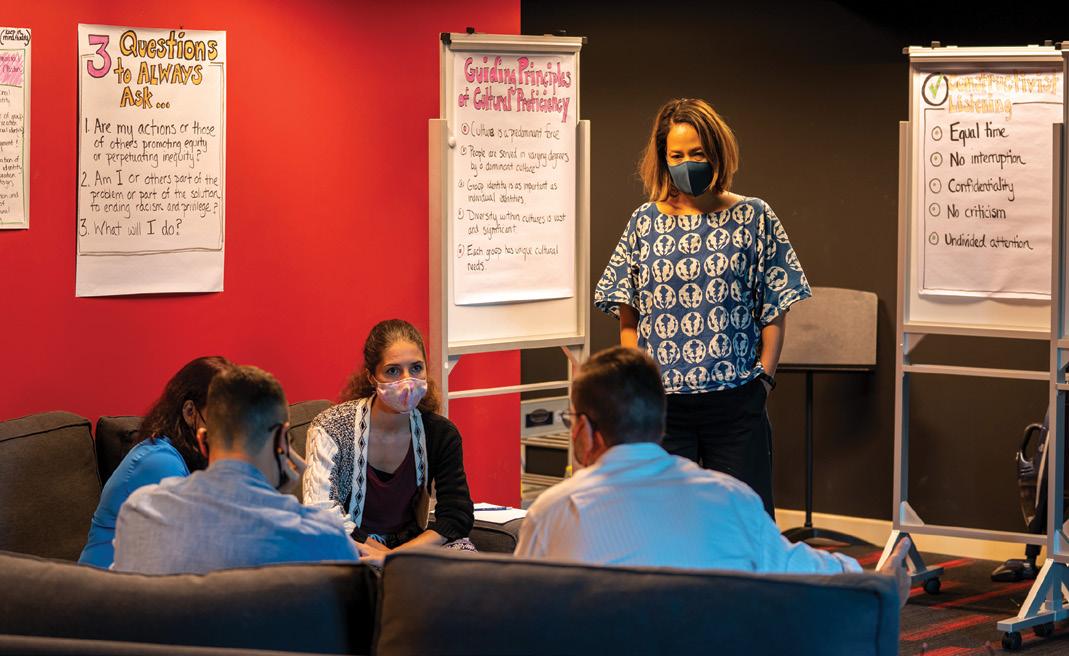
The UWC mission compels the College to assess the ways in which the organisation, including our community, supports diversity, equity and inclusion. This requires questioning the role of the College within systems that perpetuate inequities; both through the community experience of the culture and through the teaching and learning in the school.
UWCSEA began a more intentional and structured approach to our mission-led aspiration to create a more equitable and inclusive school through the development of the College Strategy in 2018, and initial strategic work within Diversity, Equity and Inclusion (DEI). In 2018/2019, ‘Diversity Cafés’ provided important insights into the many ways the College community (students, staff, parents, alumni) understood the concepts of diversity and provided some insight into how the College might structure and prioritise the important work to come in the following years. A number of initiatives to support various community members ensued and have flourished in the years since - perhaps the most visible last year being the ‘rainbow stairs’ which were installed on the stairs to the main library on Dover Campus during the summer holiday break after being designed by students.
The ‘Values in Action’ project further highlighted the important place that diversity and inclusion has within the UWCSEA community and how living the UWC mission must include authentic action. The consultation process resulted in the adoption of a new set of values which were integrated into the newly revised UWCSEA Guiding Statements during the 2020/2021 year.
The College continued the anti-racism work commenced in the previous year, with efforts focused on becoming an antiracist organisation, while recognising our long-term commitment to all facets of DEI, including working to address structural racism and inequity. All teaching and administration leaders participated in Courageous First Steps training, and workshops for stakeholder groups across the College were developed and held online (and face to face when permitted) covering topics of Unconscious Bias and Cultural Intelligence.
Work in Linguistic Diversity, outlined earlier in this report, was also a result of a focus on creating a strategic response to the needs of our community.
A Values in Action consultation, launched at the start of the 2019/2020 school year, invited contributions from multiple stakeholder groups across both campuses. The purpose was to review the existing list of values for relevance in our current context, and to realign their expression into a set of values and descriptions that could be used to guide behaviours expected of all community members: students, staff, parents, alumni and governors.
The initial outcomes, which were the result of a series of extensive workshops with all stakeholder groups, were presented to the Board of Governors in June 2020 for review. Importantly, these newly revised values were incorporated into the UWCSEA guiding statements, which were undergoing a concurrent review process, outlined earlier in this report.
Following this, in the 2020/2021 school year, the College has began the process of ‘testing’ these new College values in a range of different scenarios which saw stakeholders with possibly differing views use the values as a lens for commencing discussions; including Dover Campus project planning, staff medical provision review and in planning the upcoming 50th anniversary celebration activities and events.
Each time the values ‘stood up’ as being fit for purpose and so the next step in the process was to bring parent communities together in small groups online and face to face (in the brief hiatus when that was allowed!) to identify how those values might play out as a set of community agreements for the parent community. These workshops explored the link between these values (what we expect from ourselves and each other) and the behaviours (actions) that will demonstrate they are being lived on campus and supporting the culture of the College. A follow-up survey for the whole community gave others the opportunity to input and a set of Community Agreements will be put in draft, for testing and launch in the 2021/2022 school year.
Commitment
embracing challenge | engagement | dedication to the mission | perseverance | resilience | purpose | grit | diligence | passion | autonomy
Compassion
empathy | kindness | help | compassionate | caring | support | forgiveness | encouragement | generosity | balance | happiness | gratitude
Inclusion diversity- belonging | acceptance | equity | equality | collaboration | teamwork | multicultural | avoid prejudice | fairness | unity | intercultural competence | identity | community | friendship | local community | harmony
Integrity
principled | honesty | accountability | being your best self | maximising your potential | challenging status quo | courage | idealism | independence | self management | authenticity | evidence-based | critical thinking
Openness
willingness to listen | withholding judgement | humility | openness to other ways of being | changing one’s perspective based on new evidence | perspectives | tolerance | curiosity | flexibility
Responsibility
To one another, to the planet and to future generations | action orientation | moral and ethical service obligation | minimising harmful impacts | agency | empowerment | morally responsible | leadership for positive change | duty
Trust
Presumption of positive intent | building and maintaining relationships | do no harm | connection | self awareness | loyalty | respect
India 13.0%
United Kingdom 11.8% United States 8.7% Australia 8.3% Singapore 7.0% China 6.6% Japan 6.5% South Korea 5.3% Netherlands 3.2% France 3.1% Others (70 nationalities) 26.5%
24.0% India 11.8% United Kingdom 8.5% Australia 7.6% United States 7.4% China 7.1% Singapore 4.8% Japan 3.4% Canada 2.9% South Korea 2.3% Hong Kong 20.3% Others (64 nationalities)
3.0% Canada 11.8% UK 18.1% India 7.0% Singapore
8.2% USA 2.4% France
7.0% China 5.7% Japan
4.2% South Korea 8.4% Australia
Countries represented by UWCSEA students
Albania; Argentina; Armenia; Australia; Austria; Bangladesh; Belarus; Belgium; Bhutan; Bolivia; Botswana; Brazil; Brunei Darussalam; Bulgaria; Burkina Faso; Cambodia; Canada; Chile; China; Colombia; Croatia; Czech Republic; Denmark; Ecuador; El Salvador; Estonia; Ethiopia; Fiji; Finland; France; Georgia; Germany; Ghana; Greece; Guatemala; Haiti; Hong Kong; Hungary; India; Indonesia; Ireland; Israel; Italy; Jamaica; Japan; Jordan; Kazakhstan; Kenya; Latvia; Lithuania; Macao; Macedonia; Malawi; Malaysia; Maldives; Malta; Mauritius; Mexico; Moldova; Monaco; Mongolia; Montenegro; Myanmar; Namibia; Nepal; Netherlands; New Zealand; Norway; Pakistan; Panama; Paraguay; Peru; Philippines; Poland; Portugal; Romania; Russia; Senegal; Serbia; Sierra Leone; Singapore; Slovenia; South Africa; South Korea; Spain; Sri Lanka; Sweden; Switzerland; Taiwan; Tajikistan; Tanzania; Thailand; Turkey; Ukraine; United Kingdom; United States; Uruguay; Vanuatu; Venezuela; Vietnam; Zambia
Dover Campus
72 88 Languages spoken across College
68
East Campus
The founder of the UWC movement, Kurt Hahn, believed the experience of boarding with other young people from around the world should be at the heart of UWC’s philosophy. In 2020/2021, the residential communities in the Kurt Hahn and Nelson Mandela Houses on Dover Campus and Tampines House on East Campus provided a residential boarding experience aligned with our mission albeit while coping with the ongoing challenges created by the global pandemic. Our residential community continued to show exceptional resilience and demonstrated both commitment to care and self management as they rose to the challenge of either remote learning for an extended period before being able to join the school community at the start of the year, and for what was for many a whole year away from family as the community members - students and staff - were often unable to travel home.
The College community benefits tremendously from the presence of scholarship students who make up around one third of our boarding community. The diversity of background, culture, socio-economic status and life experience of our scholars enriches the everyday life of our whole community, and this is particularly true of the UWCSEA boarding experience.
In the same way as all other UWCSEA High School students, scholarship recipients are selected on the basis of their potential to have a positive impact on their local and global community, and must have the academic ability to meet the demands of the UWCSEA learning programme. Some scholars are selected by the College directly with consultation through the UWC National Committee, but most are selected through their country’s UWC National Committee.
In 2020/2021, the UWCSEA community welcomed 105 scholars from 65 countries to our boarding community in Singapore, and supported another seven to attend our sister UWC schools and colleges around the world.
Countries represented by scholars Albania; Argentina; Austria; Belarus; Belgium; Bhutan; Bolivia; Botswana; Brazil; Burkina Faso; Cambodia; China; Colombia; Denmark; Ecuador; El Salvador; Estonia; Ethiopia; Fiji; France; Georgia; Germany; Ghana; Guatemala; Haiti; Hong Kong; Hungary; Indonesia; Israel; Italy; Jamaica; Jordan; Kazakhstan; Kenya; Latvia; Lithuania; Macedonia; Malawi; Malaysia; Mexico; Moldova, Republic of; Montenegro; Myanmar; Namibia; Netherlands; Panama; Paraguay; Peru; Philippines; Poland; Portugal; Russian Federation; Senegal; Serbia; Sierra Leone; South Africa; Spain; Sri Lanka; Tajikistan; Tanzania; Thailand; Ukraine; Venezuela; Vietnam; Zambia
UWCSEA’s vision is to be a leader in international education, with a worldwide reputation for providing a challenging, holistic, values-based education. The recruitment and retention of excellent staff who are aligned to the mission and values of the UWC movement remains central to this vision.
The College provides specialist teaching staff for students of all ages, recruiting fully qualified teachers who have experience teaching in international environments. Many have postgraduate qualifications, ensuring that we are able to offer the highestquality experience to our students.
In terms of Educational Support staff, this includes provision of teacher assistants in the Primary School; technical, PE, and laboratory assistants in science and other specialist classrooms in the Middle and High Schools, as well as professionally experienced support staff and coaches in the Physical Education, Drama, Design Technology and Music Departments.
extensive business operations of the College are supported by similarly qualified and experienced staff. Our administrative and support staff provide our teaching staff with support that enables them to focus their energy on providing an outstanding educational experience for our students.
College is an equal opportunity employer, and our staff are an important part of our inclusive community, and which celebrates diversity. In much the same way as we consider diversity factors in applications from qualified students for the fresh perspectives they will bring to their cohort, we welcome staff who contribute to our community in the same way. Many of our administrative, educational support and operations staff are Singaporean, and provide unique connections with the community in which we live and learn.
At the heart of the College’s alumni engagement programme is the opportunity for the UWCSEA community to remain connected—with each other, with the UWC movement and with the ideals of the mission—by encouraging life-long connections and mutually beneficial relationships.
UWCSEA alumni are invited to get involved and give back in many ways. The Alumni Relations team continued to offer opportunities for our network of alumni around the world to stay connected with the College through events and communication services including e-newsletters, the website and the publication of the 17th edition of One°North magazine.
A new Alumni Relations Strategy and accompanying mission statement were developed at the start of the 2020/2021 school year to guide the transition into a new era of alumni engagement. The aim is to leverage the talent and skills of our alumni, many of whom are ripe for more active engagement, by increasing opportunities for their collaboration with College staff and community members. The strategy also streamlines processes to create more effective and mission-aligned alumni programmes that stimulate engagement and foster giving back in meaningful ways.
This new strategy consists of five principle objectives:
1. Transition from a service delivery model of alumni relations to an active engagement model
2. More fully integrate alumni relations into the life of the UWCSEA Community
3. Engage alumni in professional programming activities to add value to their lives at all stages and to strengthen their connection to UWCSEA
4. Develop a culture of philanthropy within the UWCSEA Alumni Community
5. Develop appropriate fit-for-purpose systems and processes to support programme delivery and relationship management
Progress in this first year included laying the groundwork for our first virtual and largest Milestone Reunion to date. This included the establishment of a Milestone Reunion Committee composed of Class Representatives and Class Giving Ambassadors; research, training and acquisition of a dedicated virtual event platform and the development of a robust programme of events. We look forward to reporting on the success of this event in next year’s report.
This transition to the world of online events also saw the successful delivery of a series of virtual regional reunions targeting alumni living in Australia, Singapore, India, the UK, Europe and two in North America; the launch of our first Regional Alumni Chapter in Hong Kong and creation of a virtual campus tour.
Behind the scenes research and planning was done in preparation for the launch of a new online alumni networking platform that will bring together our community of alumni, staff and select students to foster engagement, strengthen connection and create informal mentorship relationships.
Building on the unique UWCSEA student experience, our purpose is to actively engage with alumni to foster mutuallybeneficial relationships with College and with each other. Employing strategic storytelling, authentic relationships and positive community-building we will develop and deliver events and experiences that address the intellectual, social and professional aspirations of our alumni and foster the many ways in which alumni can give back to the UWCSEA community.
Countries in which alumni are located Albania; Argentina; Armenia; Aruba; Australia; Austria; Bahamas; Bahrain; Bangladesh; Barbados; Belarus; Belgium; Belize; Benin; Bermuda; Bhutan; Bolivia; Botswana; Brazil; Brunei Darussalam; Bulgaria; Burkina Faso; Cambodia; Cameroon; Canada; Cayman Islands; Chile; China; Colombia; Costa Rica; Croatia; Cyprus; Czech Republic; Denmark; Dutch Caribbean; Egypt; El Salvador; Estonia; Eswatini; Ethiopia; Faroe Islands; Fiji; Finland; France; Georgia; Germany; Ghana; Greece; Guatemala; Guyana; Honduras; Hong Kong; Hungary; Iceland; India; Indonesia; Ireland; Israel; Italy; Jamaica; Japan; Jersey; Jordan; Kazakhstan; Kenya; Kuwait; Laos; Lebanon; Lithuania; Luxembourg; Macao; Madagascar; Malawi; Malaysia; Maldives; Malta; Marshall Islands; Mauritius; Mexico; Moldova; Mongolia; Morocco; Myanmar; Namibia; Nepal; Netherlands; New Zealand; Nigeria; Norway; Oman; Pakistan; Panama; Papua New Guinea; Paraguay; Peru; Philippines; Poland; Portugal; Qatar; Romania; Russia; Rwanda; Samoa; Saudi Arabia; Senegal; Serbia and Montenegro; Sierra Leone; Singapore; Slovakia; Slovenia; South Africa; South Korea; South Sudan; Spain; Sri Lanka; Sweden; Switzerland; Taiwan; Tanzania; Thailand; Timor-Leste; Trinidad and Tobago; Turkey; Turks and Caicos Islands; Uganda; Ukraine; United Arab Emirates; United Kingdom; United States; Uruguay; Venezuela; Vietnam; Virgin Islands; Zimbabwe
In August 2020, 10 members of the UWCSEA Class of 2020 began a placement in the East Campus Alumni Internship Programme. This was the third year of the programme, which began as a series of ad hoc gap year and work experience placements.
After the initial trial period, the internships were formalised into a more structured programme, which trains alumni interns to support students in their learning by working under the direction of Heads of Departments in learning environments across the College. Alternatively, interns may work with members of the administrative staff on campus to learn more about educational administration and operations.
Participants have the unique opportunity to spend some time at school in a completely different capacity, learning new skills and gaining valuable insights to support their further education and careers. While the idea came from alumni themselves, it grew in collaboration with the College, with a number of students asking to spend time on campus engaging in practical learning and supporting the community in between graduation and going to College. Driven by a mix of motivations - some thought of careers in education; others loved a specific subject and wanted to immerse themselves in it further before going on to university; others saw the value of picking up highly practical skills which would be transferable and directly useful in future.
The alumni interns worked across the East Campus in departments including biology, geography, drama, economics, psychology, English, Spanish, food science, sport science, physical education, admissions and activities. Most worked the full school day and many contributed above and beyond school hours making valuable contributions to the Activities, Service and Outdoor Education programmes. As such, the precise nature of the internship varies according to the specific departmental needs and alumni interests making it a win-win scenario for the College and for the interns.
Dover Campus has also offered an informal internship programme to many alumni over the years. In the 2020/2021 year, five alumni interns supported a number of projects and departments across the campus including:
• Sustainability projects, including working on a sustainability mapping project
• Languages Department including the helping to coordinate a language buddy programme for the Home Languages Programme
• Outdoor Education programme support
• Departmental support and projects in the High School Film, Art and Dance Departments
There are plans to launch a formalised Alumni Internship Programme at Dover Campus in the 2021/2022 school year.
I enjoy teaching and tutoring and have done so in various subjects since Grade 9. I felt that experience with larger classes as opposed to one-to-one teaching would be a great opportunity for me. I learned to balance my instruction based on the varying levels of student ability and also tried my best to use my young age as an advantage in keeping students engaged in our classes and with our subject material. I can see myself tutoring other students in university to finance my studies and since I intend on going to graduate school in STEM, I think being a teaching assistant for undergraduate classes will be an experience I will enjoy.
Hermann was the only Dover graduate participating in the East Internship Programme this year.

I have always been interested in education as a career and I thought that this was a fantastic opportunity to learn from some of the leading teachers in terms of inquiry based learning and curriculum design in the world. I was fortunate enough to attend UWCSEA for 10 years, and the values have really sunk into me. Therefore I saw no better place to start my own teaching career, than the place that so heavily shaped who I am today.
One of my key learnings from the experience is how important understanding people is for the job. I think that many people assume that the most important part of a teaching job is knowing the content but in fact, it seems that behaviour management through open mindedness, empathy and awareness go a much longer way. I am now able to more fully appreciate the hard work of teachers, and understand how they put so much thought into even the smallest things.
The internship programme interested me as I could gain work experience in academic areas that I intend to pursue in the future. I worked in the Geography Department making and updating online class resources as well as aiding in IA data collections and Geography club. All of these experiences enhanced my understanding of the subject and allowed me to continue engaging with the subject until the start of university.
The most valuable skill that the programme offered me was how to work in a professional environment. The benefit of doing the internship here was that I was learning in a familiar space, while developing skills I would apply in university and jobs in the future. Having worked in both the Geography and Activities Departments, I also gained a great sense of appreciation of all the work that goes into the student experience across all elements of the learning programme.
Sports Science was not a subject choice when I began my IB, so I took Biology in order to get the qualifications required for me to take sports science at university. Having the opportunity to intern in the then newly added Sports Science Department I was able to learn along the way which gave me an advantage in foundational knowledge when I started university. While I appreciated everything while I was at school, being behind the scenes to see first-hard the amount of time and effort that goes into organising lessons and creating resources for students gave me a newfound respect for our teachers.
I wanted to contribute something to the school before leaving and saw the Internship Programme as an opportunity to get some work-environment experience. Since I speak and write French fluently and I get along well with the members of the French Department, I thought I’d be useful.
I saw that a lot more planning time is required for the content of the lessons than the actual teaching of the lessons. Since I had other things to complete outside of the Internship Programme, such as studying for the Basic Theory of Driving test, I also learned how to prioritise my days and weeks around the Internship Programme and other external demands.

We are fortunate to have an active and engaged parent community, and enjoy an exceptional level of support from parent volunteers. This continued in the 2020/2021 year, and we are grateful to our parent community for their continued support and engagement with the school. Whenever it became possible we were pleased to welcome parents to campus, and at individual moments across the year were able to hold in person parent-student-teacher conferences, information and welcome meetings and a number of parent workshops.
It was a particularly challenging year for creating and maintaining the community connections which are so much a part of the UWCSEA experience, as opportunities to visit campus and connect with their child’s learning, and with the wider community remained curtailed as a result of the health and safety requirements of the pandemic management.


On both campuses our hard-working Parents’ Associations (PA) are managed by an elected committee of enthusiastic volunteers, who offer their time to serve the school community. In addition, a large number of parent volunteers support the programmes run by the PA throughout the year. By helping parents connect with one another and to other important groups, the PA contributes significantly to one of the College’s most important strategic goals: to build a united, diverse and strong community.
This year, many of the events on the annual cycle of activities were interrupted by the continuing restrictions in the face of the pandemic. While this was understandably disappointing for our parent community, our PA volunteers rallied and continued to contribute as class or grade-level and nationality representatives, working hard to facilitate and coordinate information flow, class updates and collate feedback in these unusual times.
Importantly, they were also integral in supporting our boarding communities during the trying periods of increased restrictions on gathering, and into the holiday periods, when many boarding students who could not travel home were welcomed into the homes and families of our day student community.
Activities this year included buddy programmes to welcome new families joining the school in August 2020 and January 2021 and the annual High School Careers Fair which went virtual as it connected students with community volunteers. Importantly, a number of PA volunteers participated in Unconscious Bias and Values in Action workshops, with PA volunteers in languages such as Chinese, Japanese and Korean attending so as to help translate the content for parents whose first language is not English.
A rare opportunity for an on-campus event was the opening of the newly renovated Parents’ Lounge on the East Campus in Term 1. Attended by a small number of safely distanced representatives from the East Campus Parents’ Association, it was an opportunity for the representatives on the committee to meet College senior leadership, including the new Chair of the UWCSEA Board of Governors.
On the Dover Campus, we were grateful to have the participation of the Parents’ Association in the CIS/WASC reaccreditation process, which began in 2020/2021.
Both Parents’ Association are registered as a society in Singapore under the Societies Act. They operate individually and have independent constitutions and Managing Committee structures which are governed by a constitution and bye-laws, with independently audited financial statements available to members each year.
A volunteer, parent-led organisation that falls under the Service umbrella of the College, PACE serves the UWCSEA community across both campuses. With a common mission and through shared values, PACE strives to support the UWCSEA Strategy to create a united community by welcoming all parents, staff and alumni. Their annual schedule of activities provides both a social network and many opportunities to contribute to the Singapore community and beyond.
Over the last 21 years, with the support of volunteers, PACE has established two libraries in Myanmar, built 12 schools in South East Asia, provided over 10 years of volunteer services to HCA hospice care in Singapore, donated over 200,000 school lunches to children in need and helped over 300 children graduate from High School and College in the Philippines. The volunteers of PACE continued their efforts in the 2020/2021 school year: over 400 volunteers were involved in supporting HCA, volunteering for Family Service Days or joining the new Community Cooking Initiatives, providing time, energy and culinary skills. The PACE Week of Giving and Getting, a fundraiser to support the ongoing nutrition programme in the Philippines and build a fifth school in Myanmar resulted in over 200 donors across both campuses raising more than S$80,000. And the regular opportunities to engage with other parents through coffee mornings and the varied activities programme continued to connect over 300 parents in the community - from PACE Cycles to PACE Online Talks about Ayurveda and Happiness. Finally, connecting with students and the College, a new PACE Youth Essay Contest called on students in Middle and High School to think creatively about discrimination and refugees. Over 250 entries saw four students awarded prize money to donate to the service organisations in Singapore or globally that inspire them.
PACE’s dedication to serving their partners abroad while overcoming the challenges at home, is a great example of the embodiment of the UWC mission made possible through the strength and generosity of the UWCSEA community.

The UWCSEA Foundation Parent Ambassadors are a group of passionate and committed parents who represent the UWCSEA Foundation within the UWCSEA community. The Ambassadors champion and support activities and events, increasing awareness of the impact of giving to the College and encouraging members of the community to make a contribution to the College of time, treasure or talent.
In a challenging year, where the regular coffee mornings could not take place in person, online meetings and virtual events continued, and the Foundation Ambassadors remained focused on supporting the fundraising activities of the College, and coordinating Class Giving activities to engage families in sustainability programmes such as Solar for East and Solar for Dover and in support of the UWCSEA Scholarship programme.
In June 2020, the annual Foundation Parent Ambassador year-end evening included the premiere launch of a short documentary about the UWCSEA Scholarship Programme which describes a schoars journey, the impact they have on the community and their younger peers, as well as the National Committee selection process and the way that the funds raised by the UWCSEA Foundation are used to enrich the experience of scholars while here at the College.

“When our skills and interests meet the world’s needs, that’s where we can make a difference.”
NATHAN HUNT, Former UWCSEA teacher and Director of Sustainability

The College has significant business operations. This section of the report provides an overview of staff and student recruitment through Human Resources and Admissions, as well as Finance and the UWCSEA Foundation for the 2020/2021 school year.
UWCSEA’s ambition is to be a leader in international education, with a worldwide reputation for providing a challenging, holistic, values-based education. The recruitment and retention of excellent teachers, and administration and operational teams who can support the mission of the College remains central to this vision.
The changes implemented for the 2020/2021 hiring cycle become more granular as the data collection and systems changes were implemented to provide the College with baseline data on current staff, and to collect data from applicants which can be used to measure progress over time. This included a review of the data collected in the staff application form and implementation of anonymous diversity-linked data collection from all applicants, together with a College-wide staff survey to provide benchmark data.
The College’s focus on professional learning and development continued in the 2020/2021 year, organised by the professional Learning and Development team.
Onsite training opportunities including professional learning days for teachers, with strategy linked whole-school and department based learning based on prioritised needs for each campus.
During the year, in response to the needs of the educational support, administrative and operations staff, ‘PD Fests’ were implemented during the holiday breaks, with staff able to select, in consultation with their line manager, from a number of skill and competency based training options raining from one hour to two or three days. Many of these courses were led by internal peers; others were sourced from external consultants. These courses included soft skills (communication, critical thinking, creativity, team building), First Aid, IT, Health, Safety and Compliance, Leadership, Further Education and other job specialist courses.
Individual training applications processed
Number of UWCSEA staff who led training for colleagues
Unique participants in external training courses
Number of UWCSEA staff participated in UWCSEA-run training
Linked to the Our Strength and Capacity strand of the UWCSEA Strategy 2018-2023, as a key enabler for bringing about the necessary development across the other the strands, the process of bringing in house the capacity to deliver a number of leadership and staff development courses was accelerated by the necessity of COVID which meant no external experts could visit the College to provide on site training.
In the 2020/2021 school year delivery of several key programmes, including the long-running Middle Leaders Development Course and the recently adopted Unconscious Bias and Courageous First Steps workshops were bought in house as a model for future learning. The decision to do so enabled the College to contextualise the workshops for the UWCSEA community and bring skills and capacity to leaders across the College while also providing more opportunities for staff to participate in the learning opportunities which are foundational to the professional development of all staff.
The UWCSEA Foundation is the fundraising arm of the College, and is a key strategic part of the Department of Engagement and External Relations. This section of the report is concerned with the activities of the UWCSEA Foundation in fundraising and stewardship.
Since its inception in 2008, the collective generosity of donors, through gifts large and small, has helped the Foundation to raise over S$30 million.
The total gifts reflect the cash received in this financial year. This does not include interest and dividends earned through investment of the endowment fund.
The Foundation Investment and Disbursement Committee (FIDC) oversees the Foundation endowment, allocating the funds over asset classes with long-term investment horizons.
Endowment funds are split between restricted and unrestricted, with restricted endowment money reserved for specific purposes, as directed by donors and/or the College. The FIDC takes advice from the College on how to apply unrestricted funds.
1971 Society
Recognises cumulative lifetime gifts in five giving levels.
Recognises those who make gifts of S$1,000 or more during the current financial year.
Recognises those who plan to leave a bequest to the College.
This section of the report outlines financial information for the 2020/2021 year for the College.
UWCSEA is incorporated in the Republic of Singapore. As a non-for-profit organisation, the College uses any financial surplus from the campuses for the sole purpose of betterment of the College. Every dollar of school fees supports the provision of our holistic learning programme, including provision of educational resources, staff and student recruitment, staff development and training, and development and maintenance of facilities in line with our mission for sustainability.
We are pleased to report that our audited financial results for the year 2020/2021, ending 31 July 2021, compare favourably to the budget approved by the Board of Governors.
Revenue grew just 0.5% versus the budget, as a result the ongoing effects of the restrictions imposed by pandemic on College operations. Operating expenses were -1.5% less than budgeted expectations. Overall, the net surplus amounted to S$17.7 million or 7.5% of revenue, favourable to budget by S$4.5 million. Surpluses were allocated to the College cash reserves, with the long term aim of ensuring the financial sustainability of the College.
Enrolment-related income comprised 92.8% of total revenue. Donations, investment income and other income contributes to 5.2%. Activities and trips income was 2.1%; notes below in the strategic development.
College income
90.4% Tuition and boarding fees and development levy 0.9% Investment income
69.7% Salaries and benefits
College expenditure 13.7% Campus operations
2.4% Admission fees 2.1% Activities & Trip revenue 1.6% Activities & Trip expenses 1.2% Donation income 3.0% Other income
69.7% of the College’s expenses are derived from salaries and benefits. Campus operations represent the next biggest expense, comprising 13.7% of the total. Learning resources, technology, administration, donation and other expenses constitute another 16.6%. The 1.6% Activities and Trips expenditure reported does not include staff costs for delivering programmes; these are incorporated in the previously noted salaries and benefits expenditure. 3.4% Learning resources 0.9% Administration expenses 1.5% Technology 9.2% Other expenses
In 2020/2021 the College continued to develop its community (weekend and after school) and holiday programmes in order to provide a first-class holistic educational programme to enrolled students. Implementation of a cost-neutral model has continued in line with the strategic aim of creating long term financial sustainability and a more inclusive programme for current students. Continuing to bring in-house the development and management of high-demand programmes for currently enrolled students has provided consistent access and increased opportunities for enrolled students at all levels of attainment. The College also continued to run subsidised school holiday programmes for enrolled students during school holiday periods where travel and external activities continued to be curtailed by restrictions imposed by the pandemic.
Funding for scholarships is generated through school fees, the UWCSEA Nominee Programme, corporations, foundations, National Committees, and parent, alumni and staff donations. A total of S$8.4 million was given to scholarships during the 2020/2021 school year, enabling the UWCSEA community to welcome 105 scholars from 65 countries to our boarding community in Singapore.
In addition, fundraising through the UWCSEA Foundation supported another seven scholars to attend other UWCs around the world
• 3 UWC East Africa Scholarships

• 2 UWCSEA Staff Fund Scholarships at Waterford Kamhlaba UWC
• 1 UWCSEA Refugee Scholarship (Iraq) at UWC in Mostar
• 1 UWCSEA Staff Fund Scholarship at UWC Mahindra
The Admissions Department is responsible for all aspects of the admission of students to the College and compliance with Singapore government regulations for admission and continued enrolment of students to foreign system schools in Singapore.
During 2020/2021, the Admissions Department continued to process a large number of applications for entry to the College. Virtual meetings and interviews replaced in-person meetings and interviews, and virtual tours and webinar Open Days replaced on-campus events.
Kindergarten to Grade 8 applications follow a process of online application with supporting documents, including interviews and in-person assessments arranged where necessary. In K1 this can involve a play-observation session held at the school. Admissions also coordinates testing for applicants who might enrol in our English as an Additional Language (EAL) or Learning Support programmes. In 2020/2021, the majority of EAL assessments were conducted virtually by the Primary and Middle School EAL assessors and coordinators.
The High School and Boarding admissions process involves an ‘immersion day’ for all applicants that gives prospective students and their families a better insight into what a UWCSEA education entails and the mission and values of the UWC movement. Conducted online in 2020/2021, the programme involves activities, discussions and assessments, giving applicants an opportunity to demonstrate how they would fit with and benefit from the education at the College. As part of this process, current High School students work with applicants in group discussion forums and provide a voice for our students during the selection process.

The Admissions Department also processes the withdrawal notifications for students who are leaving our community, either due to graduation or relocation, and supports families with immigration-related matters. There were 984 students who left UWCSEA in 2020/2021, including 584 graduates in the Class of 2021.

UWCSEA Dover is registered by the Committee for Private Education (CPE), part of SkillsFuture Singapore (SSG) | CPE Registration No. 197000825H

CPE Registration Period 18 July 2017–17 July 2023 | Charity Registration No. 00142
UWCSEA East is registered by the Committee for Private Education (CPE), part of SkillsFuture Singapore (SSG) | CPE Registration No. 200801795N
CPE Registration Period 10 March 2017–9 March 2023 | Charity Registration No. 002104
Printed on recycled paper with environmentally friendly inks | MCI (P) 030/06/2021 | OOTP-2122